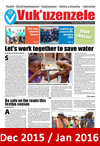Dec 2015 / Jan 2016
Dec 2015 / Jan 2016 Estelle GreeffTranslations
Jobs: Department of Social Development
Jobs: Department of Social Development JoyApplications : The Director General, Department of Social Development, Private Bag X901, Pretoria, 0001, Physical Address: HSRC Building, 134 Pretorius Street
For Attention : Ms E de Waal
Closing Date : 18 December 2015
Note : A curriculum vitae with a detailed description of duties, the names of two referees, certified copies of qualifications and identity document must accompany your signed application for employment (Z83). All shortlisted candidates for SMS posts will be subjected to a technical exercise that intends to test relevant technical elements of the job, the logistics of which will be communicated. Following the interview and technical exercise, the selection panel will recommend candidates to attend a generic managerial competency assessment (in compliance with the DPSA Directive on the implementation of competency based assessments). The competency assessment will be testing generic managerial competencies using the mandated DPSA SMS competency assessment tools. The successful candidate will sign an annual performance agreement, complete a financial disclosure form and also be required to undergo a security clearance. If the candidate is applying for an OSD post, certificates of service must be attached to the CV. No faxed or e-mailed applications will be considered. It is the applicant’s responsibility to have foreign qualifications evaluated by the South African Qualification Authority (SAQA). Failure to submit the requested documents will result in your application not being considered. Personnel suitability checks will be conducted on short listed candidates and the appointment is subject to positive outcomes of the checks. Correspondence will be limited to shortlisted candidates only. If you have not been contacted within three months after the closing date of this advertisement, please accept that your application was unsuccessful. “The Department of Social Development supports persons with disabilities”
Deputy Director-General: Corporate Support Services (Ref: 2015/34)
Branch: Corporate Support Services
Salary: R 1 267 806 per annum
This inclusive remuneration package consists of a basic salary, the states’ contribution to the Government Employees Pension Fund and a flexible portion that may be structured i.t.o. the applicable rules.
Centre: HSRC Building, Pretoria
Requirements: An undergraduate qualification (NQF level 7) and a post graduate qualification (NQF level 8) as recognised by SAQA PLUS 8 to 10 years experience at a senior management level. Knowledge of the relevant Public Service regulatory legislations. Knowledge and understanding of corporate service support systems. Knowledge of managing integrity of various internal services. Knowledge of management, coordination and integration of corporate support service.
Competencies needed:
Strategic capability and leadership skills. Programme and project management skills. Financial management skills. Policy analysis and development skills. Change management skills. Knowledge management skills. Communication (verbal and written) skills. Service delivery innovation skills. Problem-solving skills. People management and empowerment skills. Client orientation and customer focus skills. Stakeholder management skills. Presentation and facilitation skills.
Attributes:
Good interpersonal relations. Ability to work under pressure. Innovative and creative. Independent thinker. Ability to work in a team and independently. Cultural sensitivity. Adaptability. Confidentiality. Political sensitivity. Cost consciousness. Honesty and Integrity.
Duties: Provide leadership in the development and implementation of policies and strategies relating to corporate support functional areas. Manage the provision of information management systems technology services. Manage the provision of human resource management services. Manage the provision of internal and external communication services. Manage the provision of security services. Manage the provision of legal services. Provide advice and guidance to social development sector and participate in various fora in relation to corporate support matters. Ensure that the financial and physical capacity requirements of the Branch adequately reflect operational realities in accordance with the Department’s priorities and policies.
HR Related Enquiries: Mr D Chinappan, Tel: (012) 312 7504
Post enquiries: Mr TW Magwaza, Tel: (012) 312 7647
Deputy Director-General: Non-Profit Organisations (Ref: 2015/37)
Branch: Non Profit Organisations
(This is a re-advertisement and candidates who applied previously need not to re-apply).
Salary Package: R1 267,806.00 p.a. This inclusive remuneration package consists of a basic salary, the states’ contribution to the Government Employees Pension Fund and a flexible portion that may be structured i.t.o. the applicable rules.
Centre: Pretoria, HSRC Building
Requirements: Applications are invited from persons in possession of a Bachelor’s Degree or equivalent qualification (NQF level 7) and a post graduate qualification (NQF level 8) plus 8 – 10 years of experience at a senior management level. Credible experience in NPO governance and/or administration. Knowledge of the public service legislation. Knowledge and understanding of the NPO legal framework. Knowledge and understanding of government development strategies.
Competencies: Strategic capability and leadership skills. Programme and project management skills. Financial management skills. Policy analysis and development skills. Information and knowledge management skills. Communication (written, verbal and liaison) skills. Service delivery innovation. Problem-solving and change management skills. People management and empowerment skills. Client orientation and customer focus. Stakeholder management skills. Presentation and facilitation skills. Change management skills.
Attributes: Good interpersonal relationship. Ability to work under pressure. Innovative and creative. Ability to work in a team and independently. Confidentiality. Adaptability. Diplomatic. Independent thinker. Cost consciousness. Honesty and Integrity.
Duties: Lead the review, development and implementation of the administrative and regulatory framework within which the non-profit organisations can conduct their affairs. Lead processes to create an environment in which non-profit organisations can flourish and maintain adequate standards of governance, transparency and accountability. Ensure the implementation of an efficient administrative and information management system for registration and accessibility of reliable information concerning registered non-profit organisations. Lead the development and implementation of multi-sectoral and multi-disciplinary programs. Promote a spirit of co-operation and shared responsibility with other organs of state donors and amongst other interested persons in their dealings with non-profit organisations.
HR Related Enquiries: Mr D Chinappan, Tel: (012) 312-7504
Post Related Enquiries: Mr TW Magwaza, Tel: (012) 312 7647
Let's work together to save water
Let's work together to save water andileSouth Africans have been urged yet again to use water sparingly. The call was made by the team of government Ministers dealing with water scarcity and drought, which is led by the Minister of Cooperative Governance and Traditional Affairs (Cogta), Pravin Gordhan.
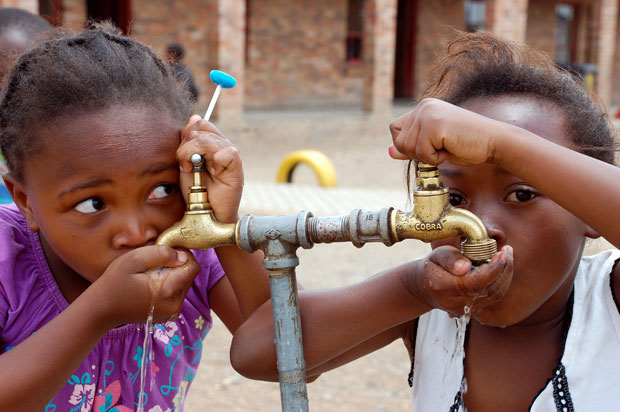 The committee, which is made up of the Departments of Water and Sanitation; Agriculture, Forestry and Fisheries; Rural Development and Land Reform; and Cogta, warned that South Africa is a water scarce country.
The committee, which is made up of the Departments of Water and Sanitation; Agriculture, Forestry and Fisheries; Rural Development and Land Reform; and Cogta, warned that South Africa is a water scarce country.
According to Minister Gordhan, Cogta has written to all the mayors in the country to take various actions to respond to the situation.
The response includes following the guidance of the Department of Water and Sanitation regarding the introduction of water restrictions and other measures to manage the situation; monitoring adherence to water restrictions and application of penalties where necessary; prioritisation of the repair of water leaks, and the promotion of water-efficient technologies such as low-flush toilet cisterns, rainwater harvesting and use of grey water for irrigation.
“Government is concerned about the impact of the water scarcity and drought to our communities, particularly households, hospitals and schools. It is for all of us in the country to take this situation very seriously,” said Minister Gordhan.
Water scarcity is caused by the ongoing lower-than-normal rainfall, which started at the beginning of 2015 and has caused drought conditions across the country. The lower rainfall is caused by El Niño, a global weather pattern that denies moisture to the sub-Saharan region.
According to the South African Weather Service, the dry weather is likely to continue for the remainder of this year and into March 2016, a period during which the country normally gets most of its rain.
“We are the 30th driest country in the world. Water scarcity is a serious issue in South Africa,” said Minister Gordhan, who added that the increasing severity of the drought is impacting negatively on the country in both social and economic terms.
The team of ministers also announced plans by the relevant departments to deal with the current situation.
The Department of Water and Sanitation has committed R352.6 million to initial drought intervention projects. In addition, just over R96 million was made available for interim tankering and additional interventions in Kwazulu-Natal.
More funding is still needed for a second drought declaration, which is being led by the Province's Disaster Management Unit of the Department of Cooperative Governance and Traditional Affairs.
The Department of Rural Development and Land Reform announced that livestock from the worst affected regions in five provinces would be relocated to “state-owned land”, where there is still better pasture. The department is allocating almost R187 million for this drought relief intervention.
"In the North West we have recently allocated 200 000 hectares of land. I am expecting the provincial government to disaggregate the land in the same way that KwaZulu-Natal did," said Rural Development and Land Reform Minister Gugile Nkwinti.
The drought currently affects 173 of the 1 628 water supply schemes nationally, serving approximately 2.7 million households or 18 per cent of the total national population.
Four provinces - KwaZulu-Natal, Free State, North West and Limpopo have declared drought as a disaster – with Mpumalanga at an advanced stage of preparation for the declaration of drought as a disaster, which will be completed soon.
El Nino Phenomenon
Minister for Environmental Affairs and also a member of the team of ministres dealing with water scarcity and drought, Edna Molewa, said government has been doing work to ensure that the country can plan for such instances.
She said weather predictions are done on a continuous basis. They are done on a short term basis at first and then long-term over a period of six months. The phenomenon is likely to last until summer season, which is next year.
The Minister announced that the South African Weather Services was keeping a constant watch on the state of the El Nino phenomenon, and expects that it will weaken over the winter months of 2016.
Minister Molewa noted that government understands the cycle now comes after three to five years and is an impact of climate change.
She reiterated that South Africa, like all countries, must adapt to a changing climate.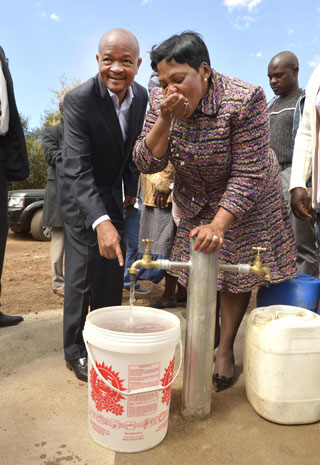
Impact on farmers
Minister of Agriculture, Forestry and Fisheries, Senzeni Zokwana, said the country has declining but sufficient stock levels of white maize until the end of April 2016, while yellow maize stocks will be very tight.
“The 2014/2015 drought affected the availability of white maize, which is a major step as well as yellow maize, which is critical for animal feed. According to the Crop Estimate Committee, the maize production estimate declined 14.2 million in 2013 to 9.8 million tonnes in 2014, 31 per cent less.”
He said the department has allocated R66 million to implement a land care programme to reduce veld and soil degradation and water loss and promote conservation agriculture practices.
The department also spent R9 million on drilling boreholes for livestock water, disseminating early warning information and providing appropriate advice to farmers.
He added that the department would continue to provide farmers with weather advisories and warnings to guide future crop plantation and reduction of stock.
Minister Gordhan called on all South Africans to work together to save water.
“We therefore call for partnerships to preserve and act to save water now in our country and plan to use our scarce water resources wisely in the medium to long term as we adapt to the impact of climate change,” said Minister Gordhan.
Be safe on the roads this festive season
Be safe on the roads this festive season andileAs the country prepares to enjoy the festive season, Transport Minister Dipuo Peters has called on motorists and pedestrians to be more careful and change their behaviour on the country’s roads during this time.
The festive period is a time when the country loses thousands of lives due to road accidents.
“The regrettable fact is that road traffic accidents cost the country in excess of R300 billion is very much at odds with our vision to eradicate the triple challenges of poverty, inequality and unemployment. The onus is on us to reverse the damage done by road carnages by placing road safety at the forefront of the transport agenda,” said Minister Peters.
She was speaking to Khayelitsha residents at a community event to commemorate World Remembrance Day recently.
“An accident happens when no one is at fault. From statistics, we have gathered that 95 per cent of crashes occur due to recklessness and someone violating traffic laws.
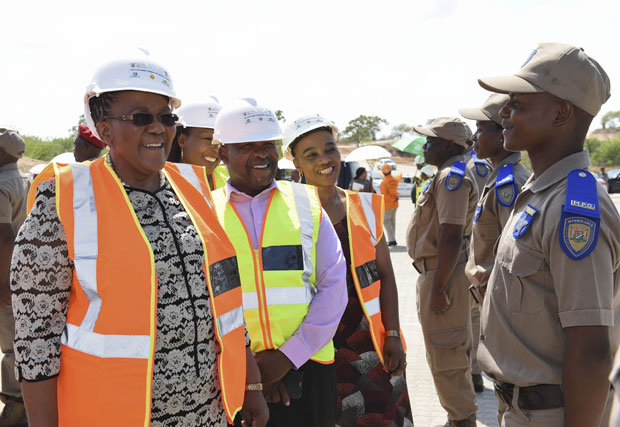 “The people who die on our roads are people we know … people die in buses, others in the trains, other people die walking on the roads. These people are family members. We talk about providers. We talk about leaders of churches. We talk about brothers, sisters, friends, colleagues and people who matter in everybody’s lives,” she said.
“The people who die on our roads are people we know … people die in buses, others in the trains, other people die walking on the roads. These people are family members. We talk about providers. We talk about leaders of churches. We talk about brothers, sisters, friends, colleagues and people who matter in everybody’s lives,” she said.
South Africa loses 14 000 lives a year due to road carnage. Out of these, 80 per cent were young people aged between 19 and 34 years.
Minister said the situation needs to improve and motorists need to change their driving behaviour.
“I would like to ask that we change our behaviour and attitudes for the better when we use the roads, especially as we approach the festive season. Buckle up! Do not drive while intoxicated or fatigued, do not use your mobile phone while driving, reduce speed, ensure the road worthiness of your vehicle and always adhere to road regulations. The human and economic cost is too high for us not to re-think the manner in which we approach road safety as individuals.”
Minister Peters appealed to the various church leaders to, not only pray for motorists to be safe on the roads, but to also preach safety on the roads in their places of worship.
“Let us tell the people that if we don’t speed, if we don’t drive recklessly and disobey the rules of the road, if we don’t speak on cell phone[s] while we drive, [we can reduce carnage on our roads].”
She further requested that they encourage people to drive roadworthy vehicles.
Accompanied by Deputy Minister Sindisiwe Chikunga, MECs and CEOs of transport entities as well as other transport stakeholders, the Minister laid wreaths to remember those who died on the roads.
She mentioned a number of well-known South Africans who have recently died on the country’s roads, including former Ajax Cape Town soccer team defender Cecil Sonwabile Lolo, who died during a car crash on 25 October on Spine Road in Khayelitsha and musician Lebo Mathosa, who died in 2006 in a car crash near Germiston, east of Johannesburg.
South Africa was also robbed of former Public Service and Administration Minister Collins Chabane, who died along with his two protectors when his vehicle collided with a truck outside Polokwane in March this year.
Minister Peters said that ironically, Minister Chabane was, at the time of his death, acting as a Transport Minister and had just spoken about road safety at a funeral that he attended.
New mobile office to process accident claims
Minister Peters also unveiled the Road Accident Fund’s mobile office that will be based in Khayelitsha, which will increase accessibility to claimants in far flung areas.
“[This is] the first of its kind. It is innovation. This is a way of getting to, in particular, those people we are worried about. Those people who are on the farms, in the small towns, in the rural areas who we have not been able to get access to services, this vehicle will get to them,” she said.
The launch of the ‘RAF Mobile Office’ follows on the success of the RAF’s award winning flagship marketing programme ‘RAF on the Road’, a community outreach campaign that started in March 2012.
Phumelela Dhlomo, RAF’s chief marketing officer, said the mobile office was being launched in time for the festive season when people are more susceptible to motor vehicle accidents.
He said the mobile office would be an extension of RAF’s current community outreach campaign, ‘RAF on the Road’.
‘RAF on the Road’ is a programme that sees a temporary office set up in a community to offer full services to members of the public as far as road accident claims are concerned.
Dhlomo said during a recent outreach in Khayelitsha, 1 600 people were reached.
After Khayelitsha, 900 people were reached in Kokstad.
“This year alone, we have reached about 30 000 people through that programme.”
Various activations are regularly conducted at churches, shopping malls, taxi ranks, garage forecourts and during joint roadblocks with traffic departments to raise awareness about the fund.
For more information about RAF call the call centre on: 0860 23 556 23. To report fraud call: 0800 00 5919
Working on Fire programme supports farmers, creates jobs
Working on Fire programme supports farmers, creates jobs andileThe Department of Environmental Affairs’ Working on Fire (WoF) programme has plans in place to support farmers who are affected by climate change.
“During El Nino farmers continuously experience veld fires on an ongoing basis. Just this year for instance, we anticipate that we will have to fight fires that are close to 3 000,” said Environmental Affairs Minister Ednah Molewa.
Minister Molewa indicated that there is a budget allocated to support small and commercial farmers.
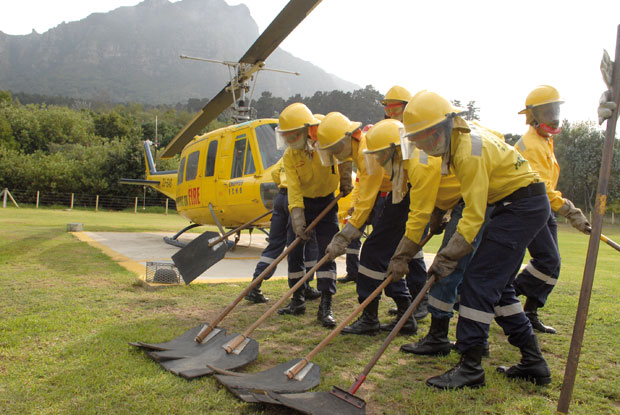 “We’ve allocated R528 million just in this financial year alone. Working on Fire has got almost R1,3 billion allocated to assist farmers,” said Minister Molewa.
“We’ve allocated R528 million just in this financial year alone. Working on Fire has got almost R1,3 billion allocated to assist farmers,” said Minister Molewa.
The Working on Fire programme has also created a total of 13 660 jobs in the past three years.
The programme was launched in 2003 as part of government’s drive to create jobs and alleviate poverty.
“This programme has the capacity to provide many more jobs, necessitating the need for a higher budget,” said Environmental Affairs Minister Edna Molewa.
The total expenditure for the Working on Fireprogramme for the 2012/13 financial year was R404 205 524, in the 2013/14 financial year it was R405 540 125 and in the 2014/15 financial year it amounted to R508 222 000.
“There is a major need for fire management capacity from WoF for both using fire for ecosystem management and combatting wild fires,” Minister Molewa said.
The programme ensures that South Africa’s Biodiversity and Ecosystems are protected and contribute to socio-economic growth as well job creation.
The programme is one of several departmental programmes under implementation through government’s Expanded Public Works Programme (EPWP).
The EPWP has been the primary vehicle through which the Department of Environmental Affairs has delivered on its job creation mandate.
“Today more than 5 000 young men and women are employed through the programme. They are recruited from marginalised communities and trained in fire awareness and education, prevention and fire suppression skills,” said the department said.
They are trained as veld and forest fire fighters and are stationed in more than 200 teams throughout South Africa.
“Furthermore a total of 592 Black Economic Empowerment compliant suppliers have benefited from the programme between 2013 and 2015, to the value of R395 144 169.00,” said the department.
Ours is a caring government
Ours is a caring government andile
As the 2015 academic year draws to a close for 801 688 National Senior Certificate candidates and just under a million higher education and training students, the nation’s attention and that of government must be shifting to the need for a disciplined and successful start to 2016.
As a responsive government, we are currently working with the higher education sector – including student organisations to implement our commitment that 2016 will be a year in which admission fees will not be raised from their current levels.
As government, we respected the premise of the #feesmustfall given our clear understanding of the poverty that affects a decreasing but nevertheless sizeable number of households around our country.
When we say we are a pro-poor government, our claim is substantiated by the varied programmes we have been implementing not just as the current administration, but as every democratic administration since 1994.
Our interventions are widespread and deep, from the provision of social grants to the most needy among us, to affordable social housing and the exemption of low-earning workers from paying taxes.
Our pro-poor programmes include such features as affordable public health care for all South Africans and the provision of public transport for millions of South Africans who continue to live well beyond metropolitan boundaries.
Through our extensive international relations and cooperation programme, government is continuously pursuing new higher education opportunities in partner countries for young South Africans who come from financially distressed backgrounds but are academically ambitious.
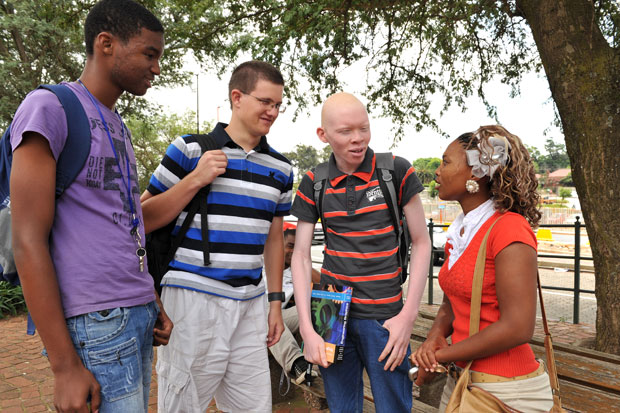 Our pro-poor programme extends to such initiatives as working with communities to create food gardens and other means to achieve food security in areas where some people may otherwise go to bed or start their day hungry.
Our pro-poor programme extends to such initiatives as working with communities to create food gardens and other means to achieve food security in areas where some people may otherwise go to bed or start their day hungry.
Our pro-poor programme has resulted in investment of multiple billions of rands over the years in such services and amenities as new road markings, pedestrian bridges, fire stations, libraries and clinics in areas that were simply ignored by the apartheid regime for decades in our past.
These investments are not cosmetic; they are bringing safety, dignity and comfort to communities that were once deprived of such basic human rights, and they are creating new standards of living and quality of life to places where such services and infrastructure are now a common part of our landscape.
Successions of ANC-led administrations have since 1994 prioritised – in word and in budget – health and education as the most important investments in our nation’s most important infrastructure: its people; its workforce.
In education, this focus produced such initiatives as the introduction of no-fee schools and the National Primary School Nutrition Programme that delivers free meals to more than 9 million learners each day; meals that fill their tummies, fuel their brains and reduce the stress under which their struggling parents may be operating.
This focus also produced the National Student Financial Aid Scheme, which currently disburses just under R10 billion a year to academically deserving students who don’t have the financial means to enter our institutions of higher learning.
In view of these achievements and the challenges they seek to address, this government had no inclination or plan to turn its back on students whose recent campaign focused the nation’s attention on the affordability or otherwise of higher education.
Government’s response was quick and clear, even though tough and complex choices are involved: the Minister of Finance announced in the Medium Term Budget Policy Statement that government would take care of the anticipated shortfall, and would explore sustainable partnerships with social partners, including the private sector.
This is the response of a caring government which is in touch with the needs of citizens.
This is the response also of a government which, while it empathises with poor students, does not endorse the violence and vandalism that came with aspects of the campaign on certain campuses.
In a law-abiding democracy where people have access to elected leaders and to our legislatures, we cannot tolerate chaos and destruction of the kind we witnessed.
Government is working every single day with various sectors of our society to ensure that our tomorrows are better than our todays.
It is my wish that as the 2015 academic year winds up, we will reflect critically and creatively on what we have witnessed this year, and that we will commit ourselves to a peaceful and orderly start to 2016.
Together we move our nation’s education forward.
#governmentcares!
South Africans are healthier and living longer
South Africans are healthier and living longer andileThe Department of Health has made a lot of progress in promoting healthy lifestyles for South African citizens over the past year, says Health Minister Dr Aaron Motsoaledi.
The Minister’s statement is contained in the department’s annual report for the 2014/15 financial year, which was recently tabled in Parliament.
“In the year under review, it is evident that major strides were made towards a healthy and long life for all South Africans.
“Life expectancy continued to improve mainly due to large scale access to antiretroviral therapy in South Africa leading to long survival rates of persons with HIV,” he said.
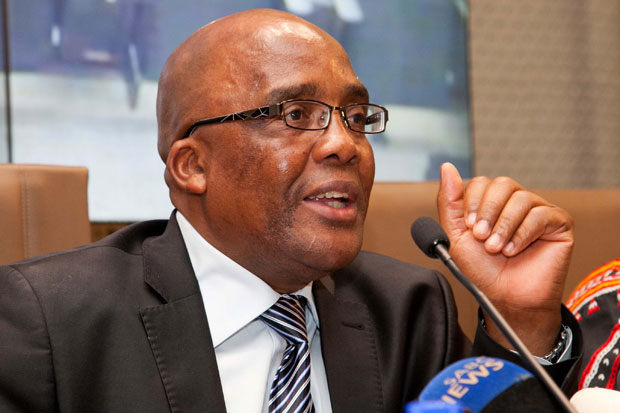 Highlighting several achievements during the period under review, the Minister said recent estimates showed improvement in life expectancy from 61.2 years in 2012 to 62.2 years in 2013.
Highlighting several achievements during the period under review, the Minister said recent estimates showed improvement in life expectancy from 61.2 years in 2012 to 62.2 years in 2013.
Highlights and achievements:
- The Infant Mortality Rate (IMR) estimates increased from 27 deaths per 1 000 live births in 2012 to 29 deaths per 1 000 live births in 2013.
- The MomConnect Project, which is a new way for women to monitor the health of their pregnancies using their mobile phones, has been fully rolled out and more than 420 000 pregnant women have subscribed to received specially tailored health messages.
- The immunisation coverage of more than 90 per cent was achieved during 2014/15.
- A total of 709 396 learners had health screening during 2014/15.
- More 90 per cent of girl learners aged nine years received the first dose HVP immunisation at schools.
The Minister said prevention remained the backbone of efforts to combat HIV and AIDS.
He said since the HIV Counselling and Testing campaign was introduced in 2010, over 35 million people had been tested.
“For the 2014/15 financial year, 9 566 097 people between the ages of 15 and 49 years were tested. The number of people on antiretroviral treatment increased to more than 3.1 million in 2014/15,” he said.
He said significant strides were made with the medical male circumcision programme, which is one of the department’s combination of HIV and AIDS prevention interventions.
Minister Motsoaledi said a total of 508 404 medical male circumcisions were conducted.
“The revision of the HIV guidelines was done for alignment with the World Health Organisation HIV Guidelines.
“The outbreak of Ebola virus disease in West Africa reminded us of the importance of basic epidemic preparedness and the importance of hand hygiene to avoid the transmission and spread of pathogens that cause communicable diseases,” said the Minister.
National Health Insurance (NHI) progress
The department commenced with a project for the reference of the National Health Normative Standards Framework for eHealth in the 700 primary health care facilities, which are in the NHI pilot districts.
“To this end, the required hardware which included 3 370 computers were distributed to 698 facilities, and integrated eight health information system initiatives targeting primary health care facilities.
“The beta implementation of this project demonstrated an improved quality of routine data and a reduction in patient waiting times at administration level.
These strides are in keeping with the National Development Plan (NDP).” Minister Motsoaledi said government’s main priority for the year 2015/16 is to continue with preparatory work for NHI.
“To this end, department initiated a process of developing and testing Diagnosis related Groups (DRG) as an alternative reimbursement tool for hospitals.
“Phase 1 of this programme involves developing a base DRG tool for the 10 central hospitals across the country.
“As at March 2015, the department had extracted clinical and financial data from central hospitals,” he said.
For more information about HIV/AIDS call the AIDS Helpline on 0800 012 322
SA maintains a tight grip on malaria
SA maintains a tight grip on malaria andileSouth Africa has for many years managed to keep a firm grip on fighting malaria infections in Mpumalanga, KwaZulu Natal (KZN) and Limpopo where the disease is most prevalent.
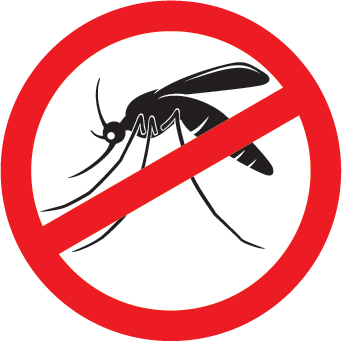 Malaria is spread via the bite of certain types of mosquitos. The mosquito may become a carrier of the disease after biting a person infected with malaria. If the mosquito goes on to bite other people, it may inject malaria parasites into their bloodstream and also infect them with the disease.
Malaria is spread via the bite of certain types of mosquitos. The mosquito may become a carrier of the disease after biting a person infected with malaria. If the mosquito goes on to bite other people, it may inject malaria parasites into their bloodstream and also infect them with the disease.
In KwaZulu-Natal, in 2000, over 40 000 malaria cases, and 340 deaths, were reported across the province, mainly in the north-eastern part.
“The province has to date managed to reduce the burden of malaria to the lowest level, where the incidence rate is now less than one per 1000,” said KwaZulu-Natal Department of Health spokesperson Agiza Hlongwane.
“In 2014 the province reported 687 malaria cases with only eight deaths in Umkhanyakude, uThungulu and Zululand, which are known to be malaria areas.”
“Despite the huge gains achieved so far in the province it is of utmost importance to take the malaria fight to the next level to sustain and accelerate progress towards malaria elimination,” said Hlongwane.
In Mpumalanga there has also been a significant drop in malaria infections reported over the years, especially in areas that are next to the Kruger National Park where malaria is most prevalent.
“During the 2015/16 financial year we are already seeing a significant decrease in infections. There was a 29 per cent decrease of malaria infections,” said Christopher Nobela from the Mpumalanga Department of Health.
Billy Teffo from the Limpopo Department of Health said the malaria cases mainly occur during the summer rainy season.
“North eastern parts of Vhembe and eastern parts of Mopani are specifically prone to malaria,” said Teffo.
“Limpopo has made steady progress in the fight against malaria. In 2000 more than 10 000 malaria cases were reported in the province. Since 2001, between 1 300 and 8 000 cases were reported annually.”
The province has an Indoor Residual Spraying programme
“This intervention sees 42 teams from the department visiting every household in the malaria risk areas to spray the inside walls of the houses to kill mosquitoes.”
“All of these teams are fully operational and since September over 150 000 houses have been sprayed. The target is to spray another one million houses over the next few months.”
Hlongwane said KZN has also implemented vector control measures that include indoor residual spraying with insecticides to control malaria.
He added that as a way of fighting the disease communities in malaria infected areas are encouraged to visit healthcare centres if they have malaria symptoms.
The Mpumalanga province has also implemented the indoor residual spraying programme in affected areas.
How to protect yourself against malaria
There are a number of ways you can protect yourself against malaria, including through the use of preventative medicine or prophylaxis.
If you travel to areas where malaria is prevalent you should ask your doctor for advice on how to protect yourself. If you suffer from medical conditions, such as epilepsy or diabetes, you must be particularly careful to consult their healthcare practitioner before visiting malaria areas.
You can prevent yourself from getting bitten by:
- Wearing long-sleeved clothing and long trousers from dusk until dawn when you are outside
- Putting on mosquito repellent lotions or sprays
- Sleeping under mosquito nets
- Staying in places that have mosquito screening on doors and windows.
What to watch out for
Malaria can develop as early as seven days after entering a malaria area and in rare cases for up to six months after leaving. Early symptoms of the disease include:
- Fever
- Chills
- Headache
- Body aches
- Joint pains
- Coughing
- Diarrhoea
Malaria can cause serious health complications and can kill you. It is very important to see your doctor immediately if you do develop any signs of the disease, even if you do think it is just flu. Also make sure to inform your doctor that you were recently in a malaria area.
Additional reporting by Government Employee Medical Scheme
Fight against a quadruple burden of diseases
Fight against a quadruple burden of diseases Estelle GreeffAnother milestone in the fight against a quadruple burden of diseases
Cabinet has recently approved the National Public Health Institute of South Africa (NAPHISA) Bill, 2015 (see Government Gazette No 39392, Vol. 605 of 11 November 2015 ) for public comments. The Bill will assist in conducting disease and injury surveillance and provide specialised public health services, public health interventions, training and research directed towards the major health challenges affecting the population of the Republic; and provide for matters connected therewith. There are pockets of excellence in the surveillance systems of communicable and noncommunicable diseases in South Africa. These systems are managed by different institutions and there is no institutional capacity for providing coordinated and integrated disease and injury surveillance data.
 The establishment of NAPHISA will help to enhance health systems effectiveness.
The establishment of NAPHISA will help to enhance health systems effectiveness.
The preamble of the Bill captures the spirit and overarching objective of what the Department of Health seeks to achieve:
Recognising that the right of all South Africans to quality health requires the State to take legislative and other measures to achieve the availability of health services, and a system of health protection focused on access, equity, efficiency and quality.
The aim of NAPHISA is to provide integrated and coordinated disease and injury surveillance, research, monitoring and evaluation of services and interventions directed towards the major public health problems affecting persons in South Africa.
The NAPHISA’s core functions will be to:
- Coordinate surveillance systems that monitor diseases and injuries
- Provide specialised reference laboratory and referral services
- Provide training and workforce development
- Conduct research and support public health interventions aimed at reducing the burden of diseases and injuries and thus improving the health of the population.
Many countries have found that National Public Health Institutes play an important role in identifying health problems and informing the appropriate health system response. Currently data that informs health policy is fragmented and this makes it difficult for the Department of Health to respond timeously to the actual health needs. NAPHISA will greatly improve evidence-based policy decision-making and mechanisms to be put in place to ensure that the impact of interventions is measured and its effectiveness evaluated.
The model of NAPHISA has been benchmarked against international best practice and against the Centre for Disease Control and Prevention in the USA – a well-established public health institute. There is also an established international network of Public Health Institutes and an African network of NPHIs (IANPHI-Africa). They are positioned to provide peer support, collaboration and knowledge sharing to new and existing institutes internationally and across the continent.
It is intended that the functions and role of NAPHISA will be positioned at a national, regional, continental and international level. Some of the existing activities in the National Institute for Communicable Diseases (NICD) are already positioned at the level of international collaboration.
NAPHISA will have memorandum of agreements with the National Health Laboratory Service (NHLS) and other entities to ensure that key objectives are realised.
What does NAPHISA seek to achieve?
NAPHISA will:
 Promote cooperation between the Republic and other countries with regard to the epidemio-logical surveillance and management of diseases and injuries
Promote cooperation between the Republic and other countries with regard to the epidemio-logical surveillance and management of diseases and injuries- Coordinate, develop or maintain surveillance systems to collect, analyse and interpret health data to guide health interventions
- Use surveillance data to advise on setting health policies, priorities and planning
- Use public health information for monitoring and evaluation of policies and interventions
- Coordinate reference laboratory and referral services
- Provide leadership and direction to provinces and local authorities in disease and injury surveillance and outbreak response
- Strengthen capacity of the health workforce in health surveillance to reduce the burden of disease and injury
- Strengthen cross-border and regional public health efforts
- Strengthen epidemiology and surveillance of communicable diseases, non-communicable diseases, cancer, injury and violence prevention
- Advise the Minister on strategies to improve the health of the population
- Support the health response and provide recommendations to government on control measures for disease outbreaks and mitigating risks and hazards for injury and violence
- Collaborate with relevant government departments and government agencies to implement communication strategies on public health issues and outbreak response
- Provide technical support to all spheres of government and other regulatory bodies on surveillance of communicable diseases, non-communicable diseases, cancer, injury and violence prevention
- Conduct research to inform policy and guidelines on communicable diseases, non-communicable diseases, cancer surveillance, injury and violence prevention and develop processes for dissemination of research findings to key stakeholders
- Strengthen advocacy, social mobilisation and partnerships for addressing communicable diseases, non-communicable diseases, cancer surveillance and injury and violence prevention
- Provide training and technical information on health issues to health professionals, government and regulatory bodies
- Contribute to human resource development in public health
- Maintain accredited reference and specialised laboratories for pathogen detection, disease and injury surveillance and monitoring, outbreak response and the provision of scientific evidence to prevent and control infectious diseases.
NAPHISA will increase the capacity to monitor communicable/non- communicable disease and injuries, thereby aiding the early detection, prevention and response to these conditions. This will ultimately contribute to the control of diseases and reduction of morbidity and mortality.
NAPHISA will be a national resource that serves public health interest and is intended to provide for a system of health protection that focuses on access, equity, efficiency and quality.
The intended outcome is improved quality of real-time disease and injury surveillance, to provide specialised public health services and formulate evidence-based public health intervention recommendations.
NAPHISA is another milestone in the Department’s determination to reduce the quadruple burden of diseases and to meet the National Development Plan health targets.
A long and healthy life for all South Africans
For more information on the NAPHIS Act, please visit the Department of Health'w website: www.health.gov.za
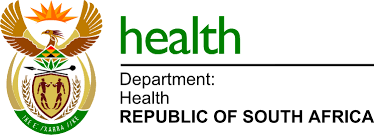
New bus system for Ekurhuleni
New bus system for Ekurhuleni andileLocal government
From early next year, commuters in Ekurhuleni will move around in new state-of-the-art buses.
The new Bus Rapid Transit (BRT) known as Harambee is expected to carry more than three million citizens from across nine towns of the Ekurhuleni Metropolitan and to change the face of public transport and infrastructure in the region.
Harambee is a Swahili word meaning “pulling or working together in unity”.
“As the manufacturing hub and a gateway to the world, Ekurhuleni’s transport system needs to be elevated and made competitive as those of other airport cities in the world. Integrated transport is key in helping the city to get organised logistically in order to manage transportation of high value goods to the airport,” said Ekurhuleni Mayor Mondli Gungubele.
He said the new buses would bring comfort, safety and reliability to the people of Ekurhuleni.
“Working with our various stakeholders in the public transport sector, we have done extensive work to build the infrastructure and the order for the buses has already been placed.
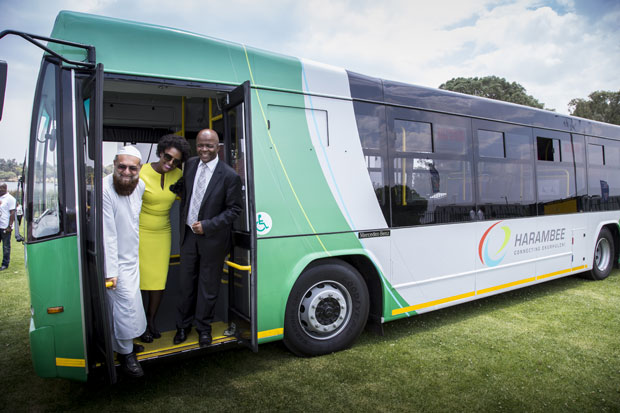 “Our people must know that their safe, comfortable and affordable movement remains one of our key priorities and has been since the establishment of Ekurhuleni in 2000.”
“Our people must know that their safe, comfortable and affordable movement remains one of our key priorities and has been since the establishment of Ekurhuleni in 2000.”
The new buses will connect the nine towns that make up Ekurhuleni, namely Benoni, Germiston, Springs, Kempton Park, Edenvale, Nigel, Brakpan, Boksburg and Alberton in a bid to overcome the problems created by apartheid spatial planning.
Construction of the Harambee BRT started in April 2014 on the complementary route between Tembisa Hospital and the Tembisa Civic Centre.
“The first phase, which is 56km, will run from Tembisa in the north via Kempton Park, OR Tambo International Airport and Boksburg, ending in Vosloorus in the south.
“The first phase will launch operationally in 2016 and the operationalisation of the entire project is projected for October 2017,” explained Gungubele.
The new system will be operated from a state-of-the-art traffic management centre in Kempton Park which will control all of Ekurhuleni’s transport services through CCTV cameras, vehicle tracking and navigation systems in the buses and at the stations.
“With regular travel times during peak and off-peak hours, passengers are able to plan their lives better and get to work, play and school on time.”
The BRT system was introduced as a means to enhance the standard of public transport and the quality of life for Ekurhuleni residents, which is also in keeping with the spirit of connecting Ekurhuleni.
The aim of the BRT system is to link different parts of a city into a network. Government wants to ensure that by 2020, most city residents are no more than 500m away from a BRT station.
BRT systems combine the best features of rail with the flexibility and cost advantages of road-based transport and have the added advantage of being easier and faster to build than a light rail transport system.
MEC for Roads and Transport Ismal Vadi said: “The key requirement for growth to the economy is good infrastructure as well as integrated transport system. The significance of Harambee is to bring cities together and we hope it integrates all elements of the communities it serves.”
MEC Vadi also announced that an intermodal facility would be built between Ivory Park and Tembisa to link up Rea Vaya and Harambee BRT systems.
KZN lends a hand to farmers
KZN lends a hand to farmers andileAs the country grapples with the drought challenge, the KwaZulu-Natal (KZN) government has put plans in place to minimise the impact of the drought on its citizens, especially the farmers.
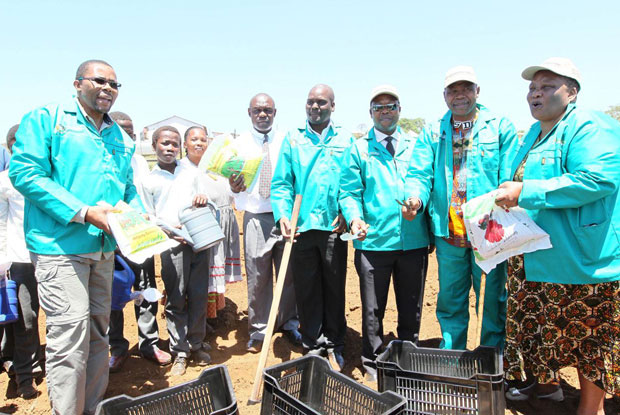 The Harry Gwala District is one of the hardest hit by the drought and has reportedly escalated from level three to level four in terms of drought effects on a one to five scale – one being the least effected and five the most effected.
The Harry Gwala District is one of the hardest hit by the drought and has reportedly escalated from level three to level four in terms of drought effects on a one to five scale – one being the least effected and five the most effected.
The provincial government has identified soya as a preferred alternative to be grown instead of maize which requires a lot of water.
The Department of Agriculture and Rural Development (DARD), together with the Old Mutual's Masisizane Fund, launched a multimillion rand project that involves growing and producing soya beans in Umzimkhulu, in the Harry Gwala Municipality.
This private-public partnerships (PPPs) came about when the DARD and Masizane Fund identified potential land that could be used for the production of soya beans in the area.
The Masisizane Fund will inject up to R26 million for the project while the KZN DARD will be allocate 300 tractors, vouchers for implements and running costs, vouchers for seeds, business monitoring and extension services.
The project will result in 144 communal estates actively participating in growing soya beans on land covering an area of over 23 000 hectares for production and agro-processing in the Harry Gwala Municipality.
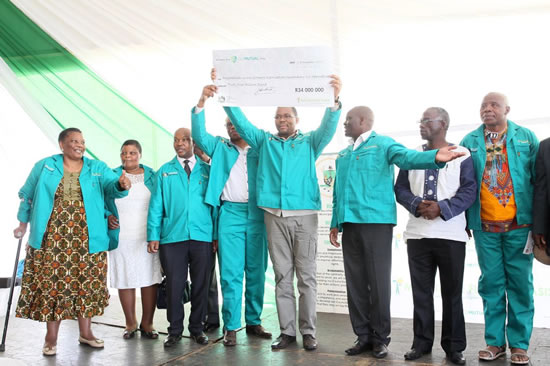 Speaking during the handover ceremony recently, Agriculture and Rural Development MEC Cyril Xaba thanked the Masisizane/Old Mutual Fund for seeing the potential in the area.
Speaking during the handover ceremony recently, Agriculture and Rural Development MEC Cyril Xaba thanked the Masisizane/Old Mutual Fund for seeing the potential in the area.
“We have a 50/50 partnership and together we will be investing over R26 million to put a total area of about 23 000 hectares under production in the Umzimkhulu area. PPPs are the way to go to free our country from the chains of poverty,” said MEC Xaba.
Simpiwe Somdyala, CEO of the Masisizane Fund, said the project provides some useful lessons in stimulating rural economic development.
“When working together as a cluster, small-scale farmers can benefit from economies of scale, and ultimately make a positive impact on their communities,” he said.
Umzimkhulu Local Municipality Mayor Councillor Mphuthumi Mpabanga thanked the DARD and Old Mutual for bringing this initiative in their area.
“Umzimkhulu has a high rate of unemployment among youth. There is no doubt that this project will open job opportunities for the people of this area,” he said.
Mthobi Dlamini of Sihleza Cooperative said the thanked the department and Old Mutual for the development.
“Our cooperative has been struggling to get financial assistance over the years but through this help Sihleza Cooperative will never be the same again,” said Dlamini.
National Health tackles non-availability of medicine
National Health tackles non-availability of medicine Estelle GreeffThe National Department of Health has appointed a task team to review the various reports on medicine availability and advise the Department on the interventions that should be implemented to address the challenges.
 The task team is made up of both local and international experts in the field of medicines and medicine supplies. They include members from the World Health Organisation (WHO), Health Action International (HAI), Management Sciences for Health (MSH) and supply chain management services and have extensive experience working in several countries supporting medicine supply systems.
The task team is made up of both local and international experts in the field of medicines and medicine supplies. They include members from the World Health Organisation (WHO), Health Action International (HAI), Management Sciences for Health (MSH) and supply chain management services and have extensive experience working in several countries supporting medicine supply systems.
 The task team reviewed reports from the Public Service Commission, the Ministerial Task Team on Pharmaceuticals and the Stop Stockouts Reports and recognised that the reasons for medicine unavailability at facilities are varied. Some of the key contributors include:
The task team reviewed reports from the Public Service Commission, the Ministerial Task Team on Pharmaceuticals and the Stop Stockouts Reports and recognised that the reasons for medicine unavailability at facilities are varied. Some of the key contributors include:
- Essential medicines that are no longer of any commercial value and no longer produced by manufacturers or their production is not prioritised (abandoned essential medicines)
- Difficulties with the manufacture of a medicine in line with orders received
- Delays in intercontinental transport systems
- Orders not received in time or insufficient quantities ordered
- Supply accounts not paid within 30 days
- Quantities ordered in excess of estimated contracted quantities
- Depots do not supply medicines as per quantity ordered from facilities
- Not ordering adequate quantities of medicines for the needs of patients seeking care at a facility
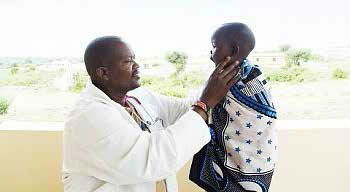 The task team has proposed that interventions are structured to address each of the above areas. The problem of abandoned essential medicines is an international challenge, which the team has proposed must be addressed by the WHO. A global meeting has been scheduled for December 2015 to discuss a global response to abandoned essential medicines.
The task team has proposed that interventions are structured to address each of the above areas. The problem of abandoned essential medicines is an international challenge, which the team has proposed must be addressed by the WHO. A global meeting has been scheduled for December 2015 to discuss a global response to abandoned essential medicines.
A broader stakeholder meeting was convened to discuss the proposed interventions by the task team. Stakeholders included provincial health departments, non-governmental organisations, civil society organisations, pharmaceutical manufacturer associations, pharmacy associations and medical scheme administrators. The National Department of Health embarked on a number of interventions to address medicine non-availability at facilities. The task team endorsed these interventions and proposed additional measures.
 The stakeholder meeting reviewed the proposed interventions by the task team and adopted the following: The use of an online monitoring tool that the National Department developed in partnership with Clinton Health Access Initiative, which will serve as an early warning system at supplier level. Our information suggests that this system is unique – no other country has a similar system that monitors medicine supply at manufacturer level. The tool also monitors the time taken for suppliers to be paid.
The stakeholder meeting reviewed the proposed interventions by the task team and adopted the following: The use of an online monitoring tool that the National Department developed in partnership with Clinton Health Access Initiative, which will serve as an early warning system at supplier level. Our information suggests that this system is unique – no other country has a similar system that monitors medicine supply at manufacturer level. The tool also monitors the time taken for suppliers to be paid.
Monitoring medicine availability at facility level will be addressed through the deployment of stock visibility technology using mobile technology for clinics and a computerised system for hospitals. This system would allow for full visibility of stock through to facility level. The proposed mobile technology system is being deployed across the country with two provinces already completed. The system sends automated alerts to facility managers, district pharmacists, depot managers, heads of pharmaceutical services and heads of department alerting them of low stock levels.
 In order to address the erratic ordering and poor quantification, tender quantities will be ring fenced at provincial level. Orders will be placed in line with the estimates submitted at the commencement of the tender. A forecasting tool has also been developed to assist provinces with tender estimates. The tender specifications will be amended to require companies to bring in buffer stock to meet demand that is in excess of the usual orders.
In order to address the erratic ordering and poor quantification, tender quantities will be ring fenced at provincial level. Orders will be placed in line with the estimates submitted at the commencement of the tender. A forecasting tool has also been developed to assist provinces with tender estimates. The tender specifications will be amended to require companies to bring in buffer stock to meet demand that is in excess of the usual orders.
The team proposed that the role of provincial depots should be reviewed in line with the more efficient medicine distribution models used in the private health sector - the use of a cross-docking system with an increased number of medicines distributed through the direct delivery model. This model is used effectively in the private sector to deliver medicines within a few hours in most facilities.
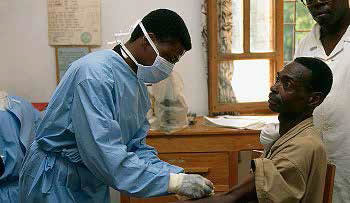 The importance of effective communication to address the non-availability of medicines is crucial. The meeting recognised that the non-availability of essential medicines is a global problem and communication should be directed to prescribers, dispensers and patients on duration of the shortage, alternative therapies and other relevant supply information.
The importance of effective communication to address the non-availability of medicines is crucial. The meeting recognised that the non-availability of essential medicines is a global problem and communication should be directed to prescribers, dispensers and patients on duration of the shortage, alternative therapies and other relevant supply information.
New houses make dreams a reality
New houses make dreams a reality Estelle GreeffLocal government
When Mary Miles turned 63 never in her wildest dreams did she think she would receive a brand new house from the Northern Cape Government as a birthday gift.
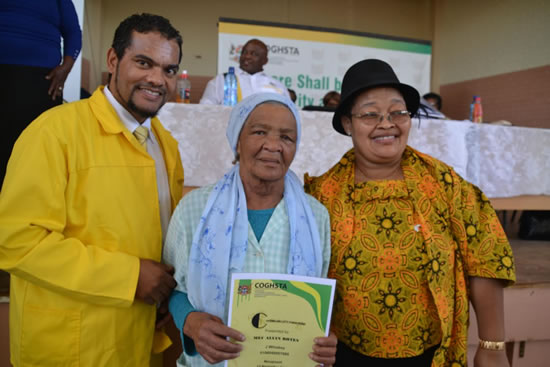 Miles is one of the first 10 recipients of houses built by the Northern Cape Department of Cooperative Governance, Human Settlement, and Traditional Affairs, which are part of the Noupoort 33 Housing Project.
Miles is one of the first 10 recipients of houses built by the Northern Cape Department of Cooperative Governance, Human Settlement, and Traditional Affairs, which are part of the Noupoort 33 Housing Project.
“I am happy that government has honoured its commitment by providing me and my family with a house. It’s a birthday present,” said Miles.
Noupoort is a town situated in the eastern Karoo.
The department implemented the project together with the Umsobomvu Local Municipality.
The project involves demolishing the old dilapidated houses, which were built before 1994 in Noupoort.
The project is valued at R63 million and involves the construction of 33 houses which are about 40 square meters in size, consisting of two rooms, a bathroom, toilet, an open plan kitchen and lounge.
Northern Cape Premier Sylvia Lucas, who handed over the home to Miles, emphasised that the government was committed to the delivery of quality human settlements.
“We want to make sure that we use public resources in the best possible way to ensure that our people get the best services from government.
“It is our government’s conviction that every individual, particularly in the Northern Cape, has the right to adequate housing without discrimination,” she said.
The houses were built in accordance with the National Home Builders Registration Council standards.
The event was also attended by the MEC for Cooperative Governance, Human Settlements and Traditional Affairs, Alvin Botes, and the Executive Mayor of Pixley ka Seme District Municipality, John Lolwana.
MEC Botes said that providing human settlements was part of the provincial government’s goal of building 65 000 houses in the province.
When delivering his Budget Vote earlier in the year, Botes said his department was committed to rectifying 231 houses that were built pre-1994 with the assistance of the National Home Builders Registration Council (NHBRC).
He added that for the 2015/16 financial year his department committed to plan and survey over 4 000 sites and construct over 1 600 quality houses.
During the 2014/15 financial year the department completed the upgrading of more than 900 informal settlements, said MEC Botes.
*Xhanti Teki works at the Northern Cape Department of Cooperative Governance, Human Settlement, and Traditional Affairs.
Fighting poverty through food security
Fighting poverty through food security Estelle GreeffLocal government
The Chris Hani District Municipality in the Eastern Cape is playing a key role in creating jobs and fighting poverty in the area.
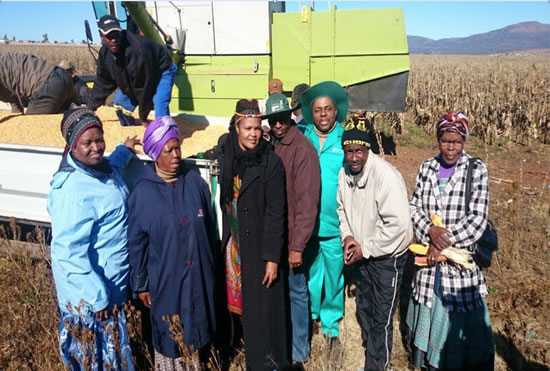 The municipality, in partnership with various stakeholders, local farmers and the private sector, made contributions to support the Qamata and Bilatye Irrigation schemes.
The municipality, in partnership with various stakeholders, local farmers and the private sector, made contributions to support the Qamata and Bilatye Irrigation schemes.
Before project implementation, communities and local farmers were consulted and agreements were made on how the project should be conducted and which land would be used for production.
The Chris Hani District Municipality contributed R2 million towards the input costs, the Grain Farmer Development Association contributed R1.6 million to help with crop insurance and application of lime and Omnia Fertilizer provided a loan of R6 million which was also used for input costs.
This helped the two schemes to produce between 7.5 to 10 tons of maize per hectare in the 2014/15 production season.
Speaking during the recent visit to the two schemes, Executive Mayor Mxolisi Koyo said government wanted other communities to get involved in crop production in areas where there were favourable weather conditions and infrastructure.
“We have to understand that South Africa cannot remain or be seen as a welfare state. Men and women have to stand up and get busy if there is to be any food on the table,” said Mayor Koyo.
He added that the Ncortha, Qamata and Emalahleni areas have also been earmarked to pilot Agri-parks.
“After five years 70 per cent of the Agri-parks shareholding will be given to local people.”
According to Mayor Koyo shareholding of the planned milling plant will also be given to the people.
“There is no reason for communities to wait on the government to farm for them,” he added.
* Lonwabo Kowa and Sabelo Kakaza work at the Chris Hani District Municipality.
Government one step ahead in drought relief
Government one step ahead in drought relief Estelle GreeffGeneral
Government is working hard to ensure that South Africans continue to have access to water even during the current drought that the country is facing.
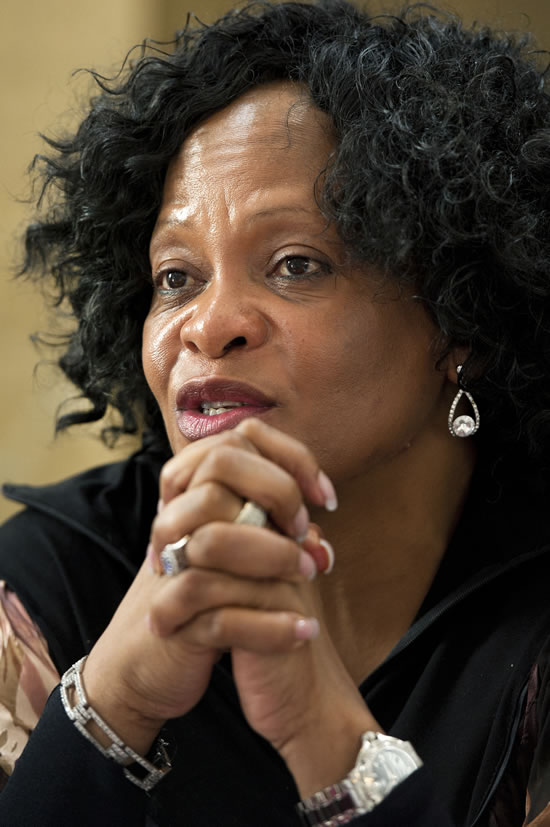 The Department of Water and Sanitation is rolling out comprehensive interventions to minimise the impact of drought.
The Department of Water and Sanitation is rolling out comprehensive interventions to minimise the impact of drought.
So far, the department has deployed water tankers to provide water to areas that are hardest hit by the drought.
These areas include KwaZulu-Natal, Free State, and Limpopo, which have been declared disaster areas.
Water and Sanitation Minister Nomvula Mokonyane said her department has committed R352.6 million to the initial drought intervention projects and a further R96.620 million to the provisional tankering and additional interventions.
She added that to address and mitigate the potential impact of the drought immediate, short, medium and long-term measures were being put in place.
The Minister said the measures included strict implementation of drought operating rules at all dams, including restrictions.
“The department will implement water conservation and demand management programmes which includes the War on Leaks and drop the block interventions.”
This also includes emergency interventions by tankering and climate research as well as hydrological and geo-hydrological monitoring.
Buying of water tankers
Minister Mokonyane said the Department of Water and Sanitation, through its National Water Resource Infrastructure Unit, is managing the procurement of 45, 18 000 litre water tankers.
A total of 682 water tanks with stands will be distributed to municipalities in KwaZulu-Natal such as the Ugu District Municipality (DM), Umkhanyakude (DM), Illembe DM and Harry Gwala DM.
“Ilembe DM in KwaZulu-Natal has completed their tank stand installation. Umgeni Water has completed the 30 tanks in Harry Gwala DM in KwaZulu-Natal, along with 81 tanks that have been installed in Umkhanyakude DM. The budget limitation of R2 million allowed for 81 tanks not the 500 they had requested,” said Minister Mokonyane.
“Additional sites are being identified in order to utilise the savings on the budget. Umgeni Water has completed 20 of the 144 Ugu DM tanks. Uthukela DM is beginning the procurement process for the installation of their tanks.”
Borehole interventions
She added that approval was granted to appoint a key service provider to buy siting, drilling and hydrogeological services to implement borehole interventions where the DM did not already have contracts in place.
Work started at the Umkhanyakude and Ilembe DM in September 2015.
“Interim tankering and second phase intervention in five district municipalities, namely Umkhanyakude, Umzinyathi, Ugu, Amajuba, and Uthungulu, have been approved for the total amount of R96 620 552.00.”
The department’s Deputy Director-General for Planning and Transformation, Deborah Mochotlhi, said that the re-use and desalination, eradication of illegal water use, drilling of boreholes in suitable areas and rainwater harvesting were short term interventions.
She added that there are transfers of schemes from the Lesotho Highlands Water Project Phase 2, emergency transfer Tugela to Goedetrouw, Othongathi River transfer to Hazelmere and infrastructure upgrade developments in Hazelmere, Clanwilliam and Tzaneen.
Mochotlhi said was appealing to every individual to use water sparingly and adhere to water restrictions as well as efficient water use practices including not filling swimming pools, or watering their gardens during the day.
Provincial dam levels
Minister Mokonyane said in selected drought areas, such as KwaZulu Natal, the average dam storage of the large schemes is 69 per cent with three of 18 schemes below 50 per cent of full supply capacity.
“An estimated 6 500 stand-alone rural communities are currently experiencing water shortages. These are mostly situated in KwaZulu-Natal, Mpumalanga, Limpopo, and North West provinces. This number could increase to over 11 000 rural communities as the dry period extends and local water resources get depleted.”
She said in drought stricken areas such as the northern parts of KwaZulu-Natal, southern parts of Mpumalanga, and selected areas in Limpopo, North West and Northern Cape, about 50 per cent of local water storage was facing challenges and needed to be managed properly.
The drought currently affects 173 of the 1 628 water supply schemes nationally, serving approximately 2.7 million households or 18 per cent of the national population.
In Gauteng the municipalities are experiencing strains on the supply systems due to high demand and current high temperatures.
Government provides support to farmers
Government provides support to farmers Estelle GreeffGovernment has allocated more than R260 million to farmers across the country to deal with the impact of drought.
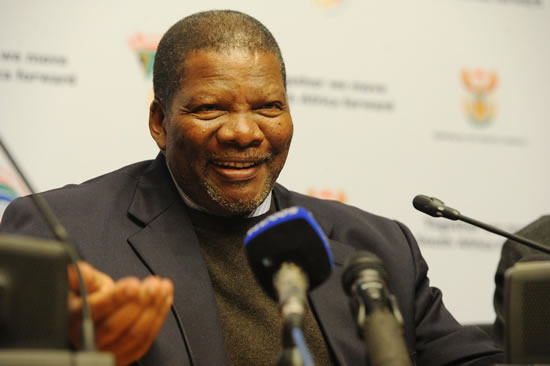 The total set aside for drought relief efforts country-wide amounts to R524 million.
The total set aside for drought relief efforts country-wide amounts to R524 million.
Minister of Agriculture, Forestry and Fisheries Senzeni Zokwana said the funds would be distributed to farmers in consultation with the provincial departments of agriculture.
The department also spent R9 million on drilling boreholes for livestock water, disseminating early warning information and providing appropriate advice to farmers.
“There will be a provision of R36.5 million by provincial Departments of Agriculture to relieve small scale and subsistence farmers in affected provinces,” said Minister Zokwana.
His department will also provide R226 million to smallholder farmers to both maintain production animals and “encourage the herd reduction through the market”.
Other measures by department will include:
- Drilling and equipping affected areas for additional boreholes for livestock.
- Facilitating and supporting the revolution of credit facilities die to crop failure.
- Monitoring food prices through the Food Price Monitoring committee to inform appropriate measures are taken to ensure food security.
- Coordinating interdepartmental food nutrition security interventions to mitigate the effects of drought on farmworkers and rural communities.
The Department of Agriculture, Forestry and Fisheries is considering reprioritising conditional grants to make funds available to help farmers in get animal feed and additional water supply for their animals.
The Minister added that the department would continue providing farmers with weather advisories and warnings to guide future crop plantation and reduction of stock.
Meanwhile the Department of Rural Development and Land Reform will relocate livestock from the worst affected regions in the five regions to state-owned land where there is still better grazing land. The department is allocating almost R187 million for this drought relief intervention.
These include the provision of water for livestock in areas where boreholes can be drilled and construction of water troughs through RADP funding support and the Animal and Veld Management programme.
According Minister Gugile Nkwinti, the department has engaged some of the commodity organisations such as the sugar industry, Grain SA who will be in partnership with the Department, and the provincial Departments of Agriculture to implement the identified short term, medium and long term draught relief interventions.
“In the North West we have recently allocated 200 000 hectares of land. I am expecting the provincial government to disaggregate the land in the same way that KwaZulu-Natal did,” said Minister Nkwinti.
Water saving tips
Water saving tips Estelle GreeffIn and around the house/business
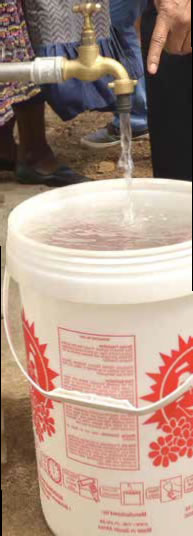 Turn the tap off between washing your face, brushing your teeth or shaving.
Turn the tap off between washing your face, brushing your teeth or shaving.- Taking a five-minute shower a day, instead of a bath, will use a third of the water used bathing in a bath tub, saving up to 400 litres a week.
- Showering can use up to 20 litres of water per minute.
- If you prefer to bath, do not fill up the bath tub.
- Taking a bath can use between 80 and 150 litres of water per bath.
- Use low-flow showerheads, dual-flush toilet mechanisms and water-efficient washing machines.
- Kettles should not be filled to the brim but with just enough water for your needs. This will reduce your electricity bill too.
- Do not overfill containers like cooking pots, as this may result in using more energy to heat the water.
- Reducing the toilet flush volume alone can save 20% of total water consumption. This can be done by putting a 2-litre cold drink bottle, filled with water and a little sand to add weight, into the cistern.
- Fix a leaking toilet otherwise it can waste up to 100 000 litres of water in one year.
- Avoid flushing the toilet unnecessarily. Dispose of tissues, insects and other waste in the trash rather than the toilet. Every time you flush the toilet, 12 litres of water is used.
- Use “grey water” — used water from baths, washing machines and other safe sources to flush your toilet.
- Do not over-fill or excessively backwash your swimming pool.
- Use a bucket rather than a hose to wash your car. If you have to use a hose, use a sprayer that can be turned off in-between spraying the car. Using a garden hose could use as much as 30 litres of water per minute.
- Do not pour paint and chemicals down the drain.
- Farmers must ensure that they keep toxic insecticides away from water sources and streams.
- Factories should take care of how they discharge mercury and other heavy metals into waste water.
- People living in rural areas should be careful not to use the river or river bank as a toilet.
In the garden
- Always water your plants during the early morning hours or in the evening, when temperatures are cooler. Between 10:00 and 15:00 one can lose up to 90% of water to evaporation.
- Every time you boil an egg, save the cooled water for your houseplants. They will benefit from the nutrients released from the shell.
- Focus on indigenous and non-water-consumptive alien plants (but not invasive alien plants).
- Group plants according to their water needs and to mulch around them.
- Water gardens less frequently, but water well. Using a garden hose could use as much as 30 litres of water per minute.
- Remove invasive alien plants on your property.
- Roof water can also be profitably stored in tanks, for watering gardens.
- Use “grey water” — used water from baths, washing machines and other safe sources — to water your garden.

Jobs: Department of Justice and Constitutional Development Dec 2015
Jobs: Department of Justice and Constitutional Development Dec 2015 Estelle GreeffFAMILY ADVOCATE LP7-LP8
REFERENCE: 08315/NC
 PACKAGE: R592 806 – R983 454 per annum. (Salary will be in accordance with OSD determination). The successful candidate will be required to sign a performance agreement.
PACKAGE: R592 806 – R983 454 per annum. (Salary will be in accordance with OSD determination). The successful candidate will be required to sign a performance agreement.
REQUIREMENTS: An LLB Degree or recognized 4 year legal qualification; Admitted as an Advocate/Attorney or qualifies to be admitted as an Advocate of the High Court; The right of appearance in the High Court of South Africa; At least 5 years appropriate post qualification/ litigation experience; A valid driver’s licence.
ENQUIRIES: Adv. P. Molokwane (053) 833 1019
DEPUTY DIRECTOR: UNIFIED COMMUNICATIONS SPECIALIST (CONTRACT APPOINTMENT ENDING 30 SEPTEMBER 2018)
REFERENCE: 15/359/ISM
PACKAGE: R569 538 – R670 890 per annum (All inclusive). The successful candidate will be required to sign a performance agreement.
REQUIREMENTS: National Diploma/Degree in Information Systems/Technology/Computer science or equivalent qualification at NQF6; 5 years relevant Audio Visual/ Video Conferencing management experience which includes at least 3 years large scale AV/VC project management experience; Experience in configuring and deploying AV/VC; Knowledge of IP Telephony and AV/ VC solutions; Project management will be an added advantage; Knowledge of application of HCI (Human-Computer Interaction), usability and IMS (Interactive Multimedia Systems) will be an added advantage.
ENQUIRIES: Ms S. Bezuidenhout (012) 315 1090
COURT MANAGER (2 POSTS)
REFERENCE: 283/15EC / 284/15EC
SALARY: R361 659 – R426 009 per annum. The successful candidate will be required to sign a performance agreement.
REQUIREMENTS: A 3 year qualification in Administration and/or a National Diploma in Services Management (NQF level 5) plus the module in Case Flow Management or equivalent qualification; At least 3 years’ managerial or supervisory experience; A valid drivers’ licence; Knowledge and experience in office and district administration; Knowledge of the financial management and PFMA; Experience in managing Trust (Third Party Funds) and Vote Account; Experience in the Court environment will be an added advantage.
ENQUIRIES: Mr. Ndamase (043) 702 7000
ASSISTANT DIRECTOR: FINANCIAL OPERATIONS MANAGER (2 POSTS):
REFERENCE: 285/15EC / 286/15EC
SALARY: R289 761 – R341 313 per annum. The successful candidate will be required to sign a performance agreement.
REQUIREMENTS: A Bachelor’s Degree in Financial or Commercial field or equivalent qualification; Three years’ experience in Expenditure and Budget Management; A valid drivers’ licence. The following can serve as an added advantage: Knowledge and experience of the financial systems of the Department of Justice including the JYP system.
ENQUIRIES: Mr. Ndamase (043) 702 7000
ASSISTANT DIRECTOR: SUPPLY CHAIN MANAGEMENT (TWELVE MONTHS CONTRACT)
REFERENCE: 203/15/WC
SALARY: R289 761 + 37 % in lieu of benefits. The successful candidate will be required to sign a performance agreement.
REQUIREMENTS: Bachelor’s Degree/three (3) year National Diploma in financial management/supply chain management or relevant equivalent qualification; Three (3) years working experience in the Supply Chain Management environment, At least one (1) year supervisory experience; Knowledge and understanding of Procurement Policy Framework Act, BBBEE and PFMA will be an added advantage; Knowledge of Supply Chain Management Framework; A valid driver’s licence.
ENQUIRIES: Mr K Pretorius (021) 462 5471
ASSISTANT DIRECTOR: COURT OPERATIONS
REFERENCE: 213/15/WC
SALARY: R289 761 – R341 313 per annum. The successful candidate will be required to sign a performance agreement.
REQUIREMENTS: A Degree or three (3) year National Diploma in Public Management or equivalent qualification; At least three (3) years supervisory/ management experience; Three (3) years office administration experience; Knowledge and understanding of Public Service Finance Management Act, Public Service Regulations; A valid driver’s licence; Statistical Analysis will be an added advantage.
ENQUIRIES: Mr N Luddy (021) 462-5471
SENIOR AUDITOR: GENERAL ASSURANCE
REFERENCE: 15/365/IA
SALARY: R289 761 – R341 313 per annum. The successful candidate will be required to sign a performance agreement.
REQUIREMENTS: An appropriate 3 year Degree or National Diploma with majors in Auditing/Internal Auditing and Accounting; Must be able to Audit Business research and Risk Assessment; At least 3 years experience in Internal Auditing of which one year should be as a team leader or potential to lead a team; Must be conversant with Auditing and Accounting standards; Successful candidates will be required to complete a security clearance; Studying toward a relevant professional qualification will be an added advantage; A valid driver’s licence.
ENQUIRIES: Mr C. Sibiya (012) 315 4561
ESTATE CONTROLLER EC1
REFERENCE: 15/367/MAS
SALARY: R151 233 per annum. (Salary will be in accordance with OSD determination). The successful candidate will be required to sign a performance agreement.
REQUIREMENTS: An LLB degree or recognized four year legal qualification.
ENQUIRIES: Mr. S. Maeko (012) 315 1996
CLOSING DATE IS 07 December 2015
NOTE: Interested applicants may visit the following website: www.justice.gov.za or www.dpsa.gov.za to view the full job specification of the above positions. Applications must be submitted on a Z83 form , obtainable from any Public Service Department or on the internet at www.gov.za. A Z83 form & CV must be accompanied by original certified copies of qualifications; identity document and a driver’s license where necessary. A SAQA evaluation report must accompany foreign qualifications. Applications that do not comply with the above mentioned requirements will not be considered. All shortlisted candidates for SMS posts will be subjected to a technical exercise that intends to test relevant technical elements of the job, the logistics of which will be communicated. Following the interview and technical exercise, the selection panel will recommend candidates to attend a generic managerial competency assessment (in compliance with the DPSA Directive on the implementation of competency based assessments). The competency assessment will be testing generic managerial competencies using the mandated DPSA SMS competency assessment tools. The successful candidate will sign an annual performance agreement, complete a financial disclosure form and also be required to undergo a security clearance. If the candidate is applying for an OSD post, certificates of service must be attached to the CV.
The DOJ&CD is an equal opportunity employer. In the filling of vacant posts the objectives of section 195 (1) (i) of the Constitution of South Africa, 1996 (Act No: 108 of 1996), the Employment Equity imperatives as defined by the Employment Equity Act, 1998 (Act No: 55 of 1998) and relevant Human Resources policies of the Department will be taken into consideration. Shortlisted candidates will be subjected to a personnel vetting process. Correspondence will be limited to short-listed candidates only. If you do not hear from us within 3 months of this advertisement, please accept that your application has been unsuccessful. The department reserves the right not to fill these positions. Women and people with disabilities are encouraged to apply and preference will be given to the EE Target.
Tel: 012 315 1111 Private Bag X81, Pretoria, 0001 Momentum Centre, 329 Pretorius Street, Pretoria
STATE LAW ADVISER LP7- LP8
REFERENCE: 15/377/SLA
PACKAGE: R592 806 – R983 454. The successful candidate will be required to sign a performance agreement
REQUIREMENTS: LLB or 4 year recognized legal qualification; At least 5 years appropriate post qualification litigation/advisory experience; Admission as an Advocate or Attorney; Experience in Constitutional Law and Administrative will be an added advantage.
ENQUIRIES: Ms. P Leshilo (012) 357 8240
SENIOR ASSISTANT STATE ATTORNEY LP5 - LP6
REFERENCE: 15/376/SA
SALARY: R392 739 – R926 586 per annum. (Salary will be in accordance with OSD determination). The successful candidate will be required to sign a performance agreement.
REQUIREMENTS: An LLB or 4 years recognized legal qualification; Admission as an Attorney; The right of appearance in the High Court of South Africa; At least 5 years appropriate post qualification legal/litigation and conveyancing experience; A thorough knowledge of legal practice, office management, accounting systems and trust accounts; Understanding of the State’s policies and transformation objective as well as the Constitution of South Africa; Conveyancing experience; A valid driver’s licence.
ENQUIRIES: Mr. E. Seerane (012) 315 1780
ASSISTANT DIRECTOR – SECURITY AND RISK MANAGEMENT (RE-ADVERTISEMENT CANDIDATES WHO PREVIOUSLY APPLIED NEED TO RE-APPLY AS PREVIOUS APPLICATIONS WILL NOT BE CONSIDERED)
REFERENCE: 2015/249/GP
SALARY: R289 761 – R341 313 per annum. The successful candidate will be required to sign a performance agreement.
REQUIREMENTS: National Diploma or degree in Risk and Security Management or equivalent qualification; Grade A PSIRA registered; Fire fighting and prevention certificate; 3 years experience of supervisory or management in Security and Risk Management; A valid driver’s licence.
ENQUIRIES: Ms. P Raadt ( (011) 332 9000
ASSISTANT DIRECTOR: AUXILIARY SERVICES
REFERENCE: 218/15/WC
SALARY: R289 761 – R341 313 per annum. The successful candidate will be required to sign a performance agreement.
REQUIREMENTS: A financial degree or relevant three year national diploma/qualification on NQF level 6; Minimum of 3 years experience in the field of Finance, Administration and Human Resource Management; Knowledge and understanding of Public Service Finance Management Act, Public Service Regulations; Knowledge and understanding of Government processes relating to procurement of assets; A valid driver’s licence.
ENQUIRIES: Ms C Ndeleni at Tel: (021) 872 3171
ASSISTANT STATE ATTORNEY, (LP3-LP4)
REFERENCE: 15/370/SA
SALARY: R229 773 – R657 924. (Salary will be in accordance with OSD determination). The successful candidate will be required to sign a performance agreement.
REQUIREMENTS: An LLB or 4 year recognized legal qualification; Admission as an Attorney; At least 2 years appropriate post legal/litigation experience; A valid driver’s licence.
ENQUIRIES: Mr. E. Seerane (012) 315 1780
SOCIAL WORKER/FAMILY COUNSELLOR (4 POSTS)
REFERENCE: 287/15EC (RE-ADVERTISEMENT) / 221/15/FA/WC / 220/15/FA/WC
SALARY: R196 341 – R227 610 per annum. (Salary will be in accordance with the OSD determination). The successful candidate will be required to sign a performance agreement.
REQUIREMENTS: Bachelor’s Degree in Social Work or equivalent qualification which allows for professional registration with the SACSSP; A minimum of 3 years appropriate experience in Social Work after registration as Social Worker with the SACSSP; Registration with SA Council for Social Service Professions (SACSSP); Knowledge and experience in Mediation; Knowledge and application of Family Law, including Mediation in certain Divorce Matters Act, Children’s Act Maintenance Act and Domestic Violence Act (inclusive of Hague Convention on International Child Abduction); A valid driver’s licence.
ENQUIRIES: PORT ELIZABETH: Mr. Hattingh 043 702 7000, CAPE TOWN: Mrs. N Daniels 021 426 1216, Worcester: Advocate Britz 023 347 1238
CLOSING DATE IS 14 December 2015
NOTE: Interested applicants may visit the following website: www.justice.gov.za or www.dpsa.gov.za to view the full job specification of the above positions. Applications must be submitted on Z83 form, obtainable from any Public Service Department or on the internet at www.gov.za. A Z83 form & CV must be accompanied by original certified copies of qualifications; identity document and a driver’s license where necessary. A SAQA evaluation report must accompany foreign qualifications. Applications that do not comply with the above mentioned requirements will not be considered. All shortlisted candidates for SMS posts will be subjected to a technical exercise that intends to test relevant technical elements of the job, the logistics of which will be communicated. Following the interview and technical exercise, the selection panel will recommend candidates to attend a generic managerial competency assessment (in compliance with the DPSA Directive on the implementation of competency based assessments). The competency assessment will be testing generic managerial competencies using the mandated DPSA SMS competency assessment tools. The successful candidate will sign an annual performance agreement, complete a financial disclosure form and also be required to undergo a security clearance. If the candidate is applying for an OSD post, certificates of service must be attached to the CV.
The DOJ&CD is an equal opportunity employer. In the filling of vacant posts the objectives of section 195 (1) (i) of the Constitution of South Africa, 1996 (Act No: 108 of 1996), the Employment Equity imperatives as defined by the Employment Equity Act, 1998 (Act No: 55 of 1998) and relevant Human Resources policies of the Department will be taken into consideration. Shortlisted candidates will be subjected to a personnel vetting process. Correspondence will be limited to short-listed candidates only. If you do not hear from us within 3 months of this advertisement, please accept that your application has been unsuccessful. The department reserves the right not to fill these positions. Women and people with disabilities are encouraged to apply and preference will be given to the EE Target.
Tel: 012 315 1111 Private Bag X81, Pretoria, 0001 Momentum Centre, 329 Pretorius Street, Pretoria
To advertise in Vuk'uzenzele call: Dorris Simpson: dorris@gcis.gov.za, 012 473 0065 or 083 273 1439
Jobs: National Development Agency
Jobs: National Development Agency Estelle GreeffChief Executive Officer (Three-year contract - renewable) Johannesburg (Ref. 2015/33)
(Three-year contract - renewable) Johannesburg (Ref. 2015/33)
Requirements: As this is a role of ultimate accountability and stature, a postgraduate degree in a related field (such as Social Development, Public Policy Studies, Business Management or Business Administration) is essential, whilst a Master’s degree or MBA would be an added advantage. Ten years’ experience in an executive/senior leadership role in a Government/NGO is also imperative. Extensive experience in strategic planning and execution, operating at board level and organisation transformation (culture/financial/service). Extensive knowledge of the Public Finance Management Act and its regulatory requirements.
Competencies needed: High-level communication (external media). Marketing/fundraising/revenue sourcing locally and internationally. Exceptional relationship building at all levels. Political understanding. Strategic capability and leadership. Programme and project management. Financial management. Change management. Knowledge management. Service delivery innovation. Problem-solving and analysis. People management and empowerment. Client orientation and customer focus. Honesty and integrity.
Attributes: Ability to initiate and support organisational transformation and change. Ability to explore and implement new ways of delivering services that will contribute to the improvement of organisational processes and to build the highest standard of ethical and moral conduct. Ability to provide vision, set organisational direction and inspire others to deliver on the organisational mandate. Ability to work together with civil society, business, academia and the international community.
Key responsibilities: Reporting to the Board of Directors, the incumbent will be responsible for the successful leadership and management of the NDA, according to the requirements set out by the NDA Act. This position is the final accountability point in relation to the executive management responsibilities of the organisation, which include leadership and governance, community relations/advocacy as well as operational, human resources and financial planning and management.
Enquiries: Mr D Chinappan, tel. (012) 312-7504
It is our intention to promote representivity (race, gender and disability) in the Public Service through the filling of this post and candidates whose transfer/promotion/appointment will promote representivity will receive preference.
Note: • A Curriculum Vitae with a detailed description of duties and the names of two referees must accompany your application for employment • It will be required of the successful candidate to undergo an appropriate security clearance • Applicants must please note that they will be required to show proof of original qualifications during the selection process • Correspondence will be limited to successful candidates only • If you have not been contacted within three months of the closing date of this advertisement, please accept that your application was unsuccessful • It is the applicant’s responsibility to have foreign qualifications evaluated by the South African Qualifications Authority (SAQA) • All short-listed candidates will be subjected to a technical exercise that intends to test relevant technical elements of the job, the logistics of which will be communicated • Following the interview and technical exercise, the selection panel will recommend candidates to attend a generic managerial competency assessment (in compliance with the DPSA Directive on the implementation of competency-based assessments). The competency assessment will be testing generic managerial competencies using the mandated DPSA SMS competency assessment tools • Personnel suitability checks will be conducted on short-listed candidates and the appointment is subject to positive outcomes of such checks • Applications received after the closing date will not be taken into consideration • No faxed or e-mailed applications will be considered.
Applications: The Director General, Department of Social Development, Private Bag X901, Pretoria 0001 or deliver by hand at the HSRC Building, 134 Pretorius Street
For attention: Mr D Chinappan.
Closing date: 4 December 2015
DSD and NDA support persons with disabilities.
Enquiries: Mr D Chinappan Tel: 012 312 7504
To advertise in Vuk'uzenzele call: Dorris Simpson: dorris@gcis.gov.za, 012 473 0065 or 083 273 1439
Invitation to bid - Public Enterprises Dec 2015
Invitation to bid - Public Enterprises Dec 2015 Estelle GreeffBID NO. : DPE 22/2015-2016
BID CLOSING DATE AND TIME : 22 DECEMBER 2015
 The Department of Public Enterprises invites service providers to submit proposals to appoint a temporary contractor in the Manufacturing Enterprises branch for the Department for a 9 (nine) month period.
The Department of Public Enterprises invites service providers to submit proposals to appoint a temporary contractor in the Manufacturing Enterprises branch for the Department for a 9 (nine) month period.
A copy of the bid document will also be available on the Department’s website: www.dpe.gov.za or a request for a copy via email can be sent to Zandarine.Theron@dpe.gov.za.
For technical enquiries contact: Mr Kgathatso Tlhakudi at Tel: (012) 431-1087 or Email: kgathatso.tlhakudi@dpe.gov.za
Get Vuk’uzenzele at your fingertips
Get Vuk’uzenzele at your fingertips Estelle GreeffVuk’uzenzele is available freely on your smartphone, tablet and other mobile devices.

 The app allows the user to read all Vuk’uzenzele newspaper editions and download these editions onto mobile devices.
The app allows the user to read all Vuk’uzenzele newspaper editions and download these editions onto mobile devices.
A mobile app is designed to run on smartphones, tablets and other mobile devices. Vuk’uzenzele is accessible to any person who has these devices.
Download your favourite newspaper now!
Vuk'uzenzele is also available online. Visit www.gcis.gov.za or www.vukuzenzele.gov.za
Let us celebrate International Human Rights Day! Our rights, our freedom, always
Let us celebrate International Human Rights Day! Our rights, our freedom, always Estelle Greeff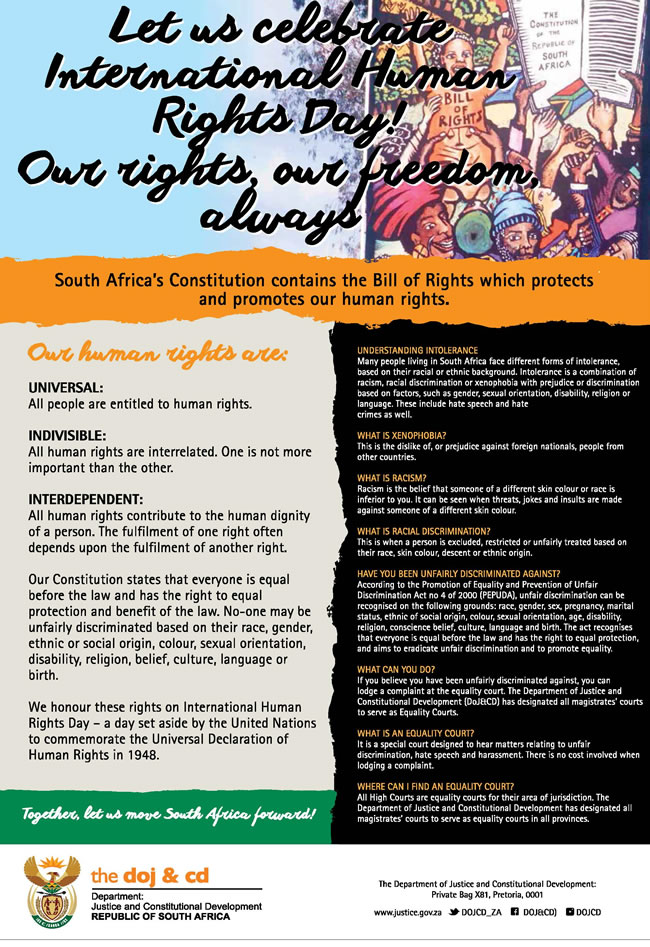
State-of-the art school for EC
State-of-the art school for EC Estelle GreeffThe Accelerated School Infrastructure Delivery Initiative (ASIDI) has not only delivered a state-of-the-art primary school in Berlin, but it also created 38 jobs to community members of Berlin in the Eastern Cape.
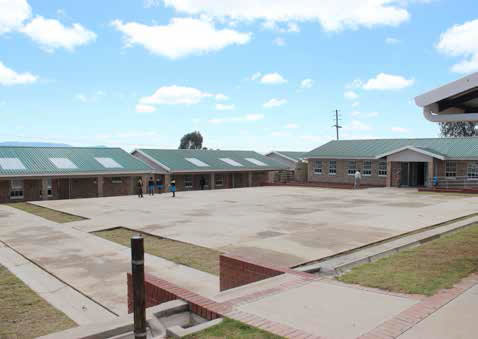 The ASIDI programme is an R8.2 billion programme that aims to eradicate schools built from inappropriate material and provide basic services such as water, sanitation and electricity to those schools that never had any.
The ASIDI programme is an R8.2 billion programme that aims to eradicate schools built from inappropriate material and provide basic services such as water, sanitation and electricity to those schools that never had any.
Nkosinathi Primary School was opened by the Department of Basic Education (DBE) as part of ASIDI.
The school was built for just under R10 million and caters for 379 learners, 89 of whom are in Grade R.
The school was upgraded with an administration block, three new classrooms, a Grade R centre, nutrition centre, media centre, science lab and a multipurpose centre.
The multi-media purpose centre, which serves as both a library and a computer centre, will also be made available for public use.
To date the ASIDI programme has completed 129 schools across the country, with the majority of new schools in the Eastern Cape.
Nkosinathi Primary School was the 61st school handed over in the Eastern Cape.
Speaking at the handover ceremony, the DBE’s ASIDI Project Manager Mtobeli Dintsi said: “The DBE has made improving and upgrading of schools in the Eastern Cape a priority.”
He also added that he was happy to have been part of a team that was making a difference in the community of Berlin and creating a positive attitude for learners towards their education.
“The increase of learners in the school is what motivated the DBE to make a difference, expand and invest in the learners of the school,” adds Dintsi.
Chairperson of the School’s Governing Body Zandile Mnweba said that the school was established in 1994 because there was a need for a primary school in Berlin.
Addressing the learners and parents, Executive Mayor for the Buffalo City Municipality Alfred Mtsi said: “I am impressed with the facilities provided at the school.”
He added that 50 per cent of the national budget goes towards education.
“Government prioritises education as education seeks to not only enrich the mind but have the ability to change any situation,” said Mayor Mtsi.
An excited Nosive Mchenge whose daughter is in Grade 1 said: “I am so excited to have my daughter attend this school because the facilities as well as the dedication of the teachers in this school are of a very high standard.”
She also added that her daughter is being given a great foundation and looks forward to attending school.
Hlumela Tshakatshe, a Grade 7 learner, said that she loves reading and can’t wait to use the new library to read as many books as she can.
She also added that she wants to be a doctor one day and that her teachers at Nkosinathi Primary School are patient and dedicated in helping her achieve her dreams.
As part of the ASIDI programme, the community of Mt Frere also in the Eastern Cape, were the proud recipients of a new state-of-the-art school with the handover of Nqantosi Senior Primary School.
The school’s new modern facilities will ensure that the 250 learners attending the school have access to quality learning and teaching.
The construction of the school provided a boost to the local community also creating 521 jobs over 18 month period.
*Vuyolwethu Hole works at the Buffalo City Municipality and Ryan Hoffman works at the Department of Basic Education.
Beware of unaccredited colleges and universities
Beware of unaccredited colleges and universities Estelle GreeffIt’s that time of the year when students across the country will look for study opportunities for the new academic year at various higher education institutions. It’s very easy for students to become victims of unaccredited or fly-by-night private institutions and must ensure the institution they intended studying with is credible.
Accredited private institutions must be able to show you the following:
- A certificate of registration with the Department of Higher Education and Training. It should detail the campus, provider and the qualifications offered.
- All higher education qualifications need to be accredited by the Higher Education Quality Committee of the Council on Higher Education. If they are not accredited they will not appear on the certificate referred to above. There is no other document detailing the accreditation, which is why checking if the qualification is on the certificate is an important step.
- All qualifications must be registered on the National Qualifications Framework (NQF) by South African Qualifications Authority (SAQA) – students should ask for the SAQA NQF identity numbers.
- All private Further Education and Training Colleges (FET Colleges) must be accredited by Umalusi. Umalusi accredits private providers of education and training as well as private assessment bodies to offer tuition and/or assessment for qualification(s) on the General and Further Education and Training Qualification Framework.
For more information contact:
Department of Higher Education and Training
Physical Address: 123 Francis Baard Street, Pretoria, 0002
Tel: +27 12 312 5911
Website: www.dhet.gov.za
Council on Higher Education (CHE)
Physical Address: 1 Quintin Brand Street, Persequor Technopark, Brummeria, 0020
Tel: +27 12 349 3840
Website: www.che.ac.za
South African Qualifications Authority
Physical Address: Physical Address: SAQA House (formerly known as Hatfield Forum West), 1067 Arcadia Street, Hatfield, Pretoria
Tel: +27 12 431 5000
www.saqa.org.za
Umalusi
Physical Address: 37 General Van Ryneveld Street, Persequor Techno Park, Pretoria, South Africa 0020
Tel: +27 (12) 349 1510
www.umalusi.org.za
Learners get access to life-changing skills
Learners get access to life-changing skills Estelle GreeffAs government increases efforts to produce at least 30 000 artisans a year by 2030 to stimulate economic growth and enable the country to remain competitive, an increased number of private companies are working with government to ensure that this goal is achieved.
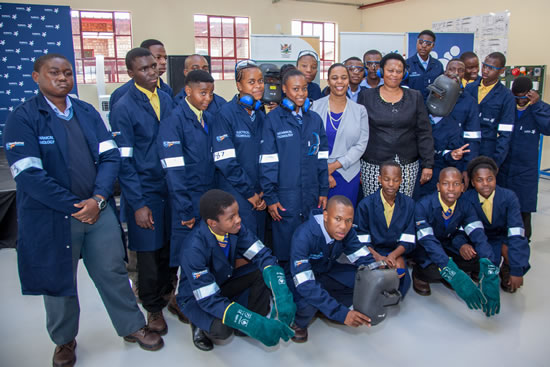 Thousands of learners across Mpumalanga are benefiting from a partnership between the Mpumalanga Department of Education and Sasol Inzalo Foundation.
Thousands of learners across Mpumalanga are benefiting from a partnership between the Mpumalanga Department of Education and Sasol Inzalo Foundation.
The petroleum company handed over laptops, learning and teaching material, as well as protective clothing to the department which will assist 2 000 pupils from technical schools in the province.
Mpumalanga MEC for Education Reginah Mhaule said government and the Sasol Inzalo Foundation have already created an enabling environment for pupils to excel and it was up to learners to focus on their studies.
“The Mpumalanga Department of Education is very grateful for the role Sasol Inzalo Foundation has played. Through this initiative I am certain that we will experience an influx of professionals such engineers, technicians or even artisans to mention just a few.
“The department is highly appreciative of institutions and individuals that respond to our call and offer us support. This has proven that a private-public partnerships truly bears fruits.”
Learners at schools, who are part of the Sasol Inzalo Foundation-sponsored Technical Schools of Excellence Network (TechSENet), will receive the 625 sets of personal protective equipment for use in practical training workshops. The protective clothing will benefit some 5 000 learners
every year.
Amicent Siwela, 15, a Grade 7 learner at Hazyview Comprehensive School, said he was grateful for the material his school had received.
“The material will really go a long way when doing practicals during our lessons. I really love mathematics and science and being able to do my assignment with proper equipment means that I am one step closer to being a engineer,” said Siwela.
Sasol Vice President for Enterprise and Supplier Development, Justice Magagula, said building technical skills is one of the key priorities of government.
“As a partner to government and a supporter of the National Development Plan, Sasol is committed to playing its part to invest in South Africa. We believe this is important as technical skills education equips the youth with life skills to start their own businesses and be able to provide employment to others,” he said.
Sasol Inzalo Foundation was established in 2008 to drive excellence in science, technology, engineering and mathematics education at all levels of the education value chain.
Through the initiative teaching and learning material and personal protective equipment was also handed over at technical schools in the Free State and Gauteng.
Fight against crime gets a digital boost
Fight against crime gets a digital boost Estelle GreeffTshwane Metro Police officers will be able to respond faster to crime thanks to the Namola App, an innovative crime fighting solution.
 The Executive Mayor of Tshwane Kgosientso Ramokgopa recently unveiled the first phase of the Namola App.
The Executive Mayor of Tshwane Kgosientso Ramokgopa recently unveiled the first phase of the Namola App.
The App is a software solution designed for the Tshwane Metro Police Department (TMPD) that creates a complimentary communication link between officers on the ground and the control room; promotes police accountability and performance and gives citizens a direct link to their nearest police officers.
The introduction of this App means that average dispatch times are reduced from 2 min 38sec to 11sec, a 13 times improvement, said Ramokgopa.
Tablets installed in TMPD patrol vehicles create a parallel communication channel between the control room and the officers on the ground.
This link enables the control room to send broadcast messages such as photographs and written descriptions of stolen vehicles and persons of interest to all or selected vehicles.
“The exploitation of this new knowledge would not be possible without the involvement of the private sector.
“The Namola App is another groundbreaking product we have introduced with the help of Project Isizwe to report and attend to crime scenes at the touch of a button.
“The added benefit of this wonderful tool is that it accommodates the voiceless and less literate groups to use their power to report incidents without difficulty.
“Indeed the partnership with Project Isizwe has enabled the City to ignite wonderful things for its populace,” said Mayor Ramokgopa.
Project Isizwe CEO Alan Craig-Knott said the commitment of the political leaders had made the milestone possible. “With their support, the next logical extension is to roll out the massively powerful tool to all emergency services.”
The launch also marked the City’s groundbreaking free Wi-Fi project, which hit a major milestone of one million unique connections in October 2015.
The Tshwane free Wi-Fi service is the largest government funded public free Wi-Fi in South Africa and has enabled over one million unique users to get online since it launched in November 2013, logging over 40.4 million connections to date.
“We are drawing a demographic dividend from our youth who are now able to engage in rich deep conversations with the City and provide meaningful feedback at the touch of a button,” added Mayor Ramokgopa.
*Blessing Manale works at the City of Tshwane.
Festive season safety tips
Festive season safety tips Estelle GreeffAs South Africans prepare to unwind and spend time with family and friends, it is important to remember to take care of yourself and your family.
Vuk’uzenzele shares some tips on how to be safe at home, on the road and while having fun.
 Advice to keep your home safe include:
Advice to keep your home safe include:
- Ask your neighbours to take out the post. Post left in the mailbox says that nobody is home.
- Make sure you have good lighting. Don’t leave the outside lights on during the day.
- Don’t let too many people know when you are going on holiday, only those you trust.
- Make sure your doors lock properly and that you have burglar bars.
- If your house is broken into, notify the police immediately.
If you are going on a road trip:
- Buckle up.
- Don’t drink and drive.
- Keep a safe following distance.
- Do not use up your energy on activities, which will increase your fatigue.
- Get enough sleep the night before, at least six hours.
- Do not travel when you are emotional or stressed out.
- Plan your trip, the route you will travel and where you will stop and rest overnight.
- Make sure your car is road worthy.
- Make sure you have a spare wheel and that it is in good condition and a jack.
- Make sure your luggage is in the boot and that is closed properly.
- Stop every two hours, taking 15 minute breaks.
- Avoid driving between 1am and 5 am.
- If you feel tired or restless, pull over at a safe stop and rest for a little while.
 If you are travelling at night:
If you are travelling at night:
- Be on the lookout for suspicious-looking people or vehicles.
- Know where you are going, do not use unfamiliar routes to get home.
- Lock your doors and close your windows.
- If you are bumped from behind, head to the nearest police station or place of safety.
- Never leave keys in your ignition to open gates.
- Don’t wait for your passengers, drive around the block or get out of the car and lock the doors.
- Never pick up hitchhikers.
- Don’t get out to assist someone who seems to be in trouble. Inform the police.
To ensure your safety while shopping:
- Avoid carrying large amounts of money.
- Don’t leave valuable belongings in the trolley.
- Don’t have your wallet or purse visible. Keep wallet in your front pocket and not the back pocket.
- Don’t let money be too visible, especially large amounts.
- Hold your child’s hand and be alert of them at all times. Always accompany them to the bathroom.
 Water safety tips:
Water safety tips:
- Always swim with an adult who can swim.
- Only swim in a public pool or sea if there is a lifeguard on duty.
- Never dive into the water unless the lifeguard says it is safe to do so.
- Never run along the edge of a swimming pool or push people in.
- Stay away from diving boards when in the pool.
- Always keep chairs and tables away from the pool fence to keep children from using them to climb over the fence.
- Do not allow anyone of any age to swim alone - drowning happens to adults too.
- When you are entertaining a group of children or adults, have a designated water watcher who is responsible for keeping track of everyone.
- Never leave children unattended in or around pools - not even for a second.
Source: SAPS, Department of Transport, SANRAL and City of Johannesburg.
Proteas to battle old rivals
Proteas to battle old rivals Estelle GreeffSport, arts and culture
 There are exciting times ahead for cricket fans, who can look forward to the Proteas taking on England and Australia on home soil.
There are exciting times ahead for cricket fans, who can look forward to the Proteas taking on England and Australia on home soil.
The Proteas will first face England in a series made up of four test matches, five One Day Internationals (ODIs), and two T20I Series
At the end of that series, South Africa will take on old foes Australia.
SA vs England
First test match
Date: 26 December – 30 December 2015
Time: 10h00
Venue: Kingsmead, Durban
Price: R20 - R210
Second test match
Date: 02 January – 06 January 2016
Time: 10h30
Venue: PPC Newlands Cricket Stadium, Cape Town
Price: R80 - R210
Third test match
Date: 14 January – 18 January 2016
Time: 10h30
Venue: Bidvest Wanderers, Johannesburg
Price: R60 - R180
Fourth test match
Date: 22 January – 26 January 2016
Time: 10h30
Venue: SuperSport Park, Centurion
Price: R80 - R210
First ODI
Date: 03 February 2016
Time: 13h30
Venue: Mangaung Oval, Bloemfontein
Price: R105 - R240
Second ODI
Date: 06 February 2015
Time: 10h00
Venue: St George’s Cricket Stadium, Port Elizabeth
Price: R120 - R250
Third ODI
Date: 9 February 2016
Time: 13h30
Venue: SuperSport Park, Centurion
Price: R80 - R230
Fourth ODI
Date: 12 February 2016
Time: 13h30
Venue: Bidvest Wanderers, Johannesburg
Price: R100 - R320
Fifth ODI
Date: 14 February 2016
Time: 10h00
Venue: PPC Newlands Crocket Stadium, Cape Town
Price: R150 - R240
First T20I
Date: 19 February 2016
Time: 18h00
Venue: PPC Newlands Cricket Stadium
Price: R150 - R240
Second T20I
Date: 21 February 2016
Time: 14h30
Venue: Bidvest Wanderers Stadium, Johannesburg
Price: R100 - R320
After the series with England, the team will enjoy a few days break before taking on Australia. The series against Australia will start with three T20I games that will be played in Durban, Johannesburg and Cape Town.
Multipurpose court improves access to sport
Multipurpose court improves access to sport Estelle GreeffSport, arts and culture
Access to sport in Upington, in the Northern Cape recevied a boost recently when the Department of Sport and Recreation, together with the Sports Trust, officially handed over a multipurpose sport court facility to Olyvenhoutsdrift Primary School.
 Deputy Minister of Sport and Recreation Gert Oosthuizen handed over the facility to the school during an outreach programme.
Deputy Minister of Sport and Recreation Gert Oosthuizen handed over the facility to the school during an outreach programme.
The outreach forms part of the roll out plan to increase access to sport at rural disadvantaged schools in the country by providing equipment to schools and building the multipurpose centres in accordance to the National Sport Plan.
This is to encourage mass participation of sport across the country so that all learners have the opportunity to participate in sport at all levels.
With the new multipurpose court learners will be able to play soccer, netball, basketball, volleyball and tennis. This is in a bid to drive the development of sports and healthy activities in and around the surrounding communities.
This facility has a 20 year life span, and a 15 year warranty and is environmentally friendly, which is also in line with the Sports Trust’s “green” policy of helping to protect the environment.
 Olyvenhoutsdrift Primary School currently participates in soccer, netball, rugby, cricket, cross country running and athletics. The school has 605 learners.
Olyvenhoutsdrift Primary School currently participates in soccer, netball, rugby, cricket, cross country running and athletics. The school has 605 learners.
The school’s top athletes are Karabo Kamfer and Anthonia De Wee, who compete at provincial level in athletics.
It is well documented that playing sport contributes to making a significant difference in the lifestyle and behaviour of children and this positive sporting influence will provide both hope and purpose to the children of this community and the surrounding schools who will be able to use this facility.
A total of 10 schools and 10 community clubs will be able to play sport on this facility, including the host school.
Joey Links, principal of Olyvenhoutsdrift Primary School, said: “Our school is honoured and proud to be the recipient of this first ever multipurpose sport court in this area, and we sincerely thank the stakeholders for their investment into the youth and people of this community.”
The current goal is to place 226 multipurpose sports court by the year 2017, and a total of 35 sports courts have been placed to date.
Source: Department of Sport and Recreation.
